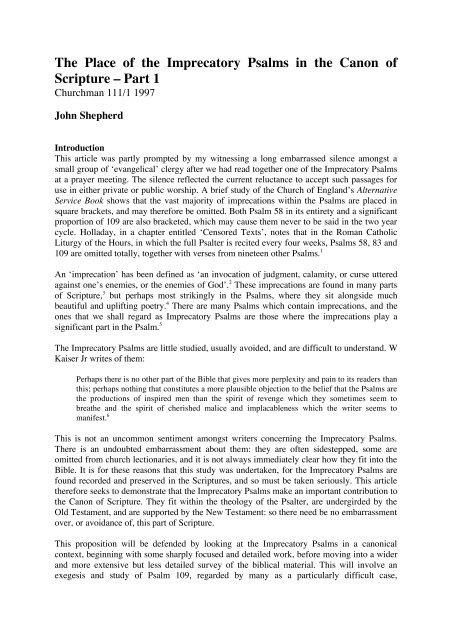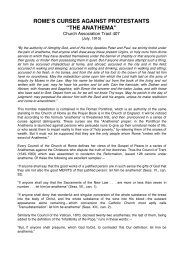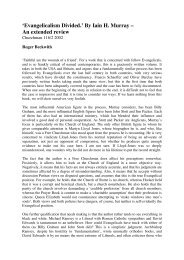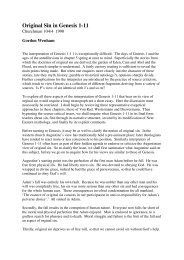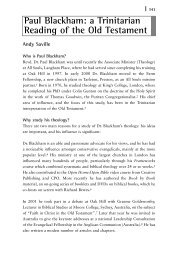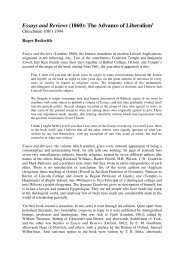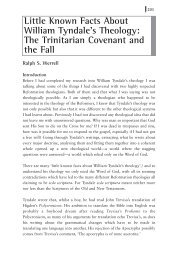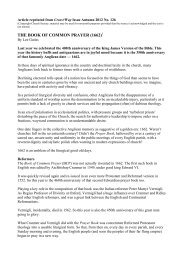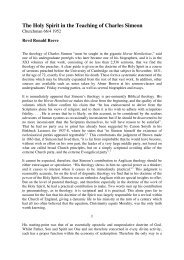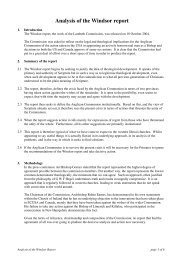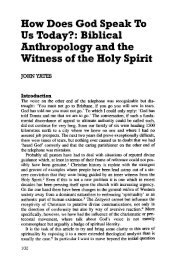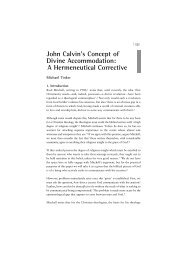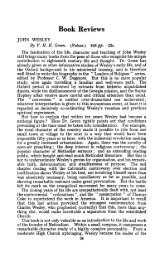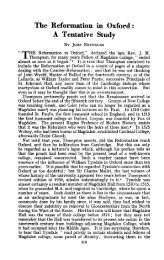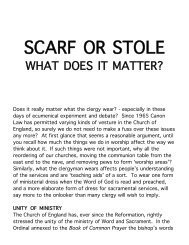The Place of the Imprecatory Psalms in the Canon ... - Church Society
The Place of the Imprecatory Psalms in the Canon ... - Church Society
The Place of the Imprecatory Psalms in the Canon ... - Church Society
Create successful ePaper yourself
Turn your PDF publications into a flip-book with our unique Google optimized e-Paper software.
<strong>The</strong> <strong>Place</strong> <strong>of</strong> <strong>the</strong> <strong>Imprecatory</strong> <strong>Psalms</strong> <strong>in</strong> <strong>the</strong> <strong>Canon</strong> <strong>of</strong><br />
Scripture – Part 1<br />
<strong>Church</strong>man 111/1 1997<br />
John Shepherd<br />
Introduction<br />
This article was partly prompted by my witness<strong>in</strong>g a long embarrassed silence amongst a<br />
small group <strong>of</strong> ‘evangelical’ clergy after we had read toge<strong>the</strong>r one <strong>of</strong> <strong>the</strong> <strong>Imprecatory</strong> <strong>Psalms</strong><br />
at a prayer meet<strong>in</strong>g. <strong>The</strong> silence reflected <strong>the</strong> current reluctance to accept such passages for<br />
use <strong>in</strong> ei<strong>the</strong>r private or public worship. A brief study <strong>of</strong> <strong>the</strong> <strong>Church</strong> <strong>of</strong> England’s Alternative<br />
Service Book shows that <strong>the</strong> vast majority <strong>of</strong> imprecations with<strong>in</strong> <strong>the</strong> <strong>Psalms</strong> are placed <strong>in</strong><br />
square brackets, and may <strong>the</strong>refore be omitted. Both Psalm 58 <strong>in</strong> its entirety and a significant<br />
proportion <strong>of</strong> 109 are also bracketed, which may cause <strong>the</strong>m never to be said <strong>in</strong> <strong>the</strong> two year<br />
cycle. Holladay, <strong>in</strong> a chapter entitled ‘Censored Texts’, notes that <strong>in</strong> <strong>the</strong> Roman Catholic<br />
Liturgy <strong>of</strong> <strong>the</strong> Hours, <strong>in</strong> which <strong>the</strong> full Psalter is recited every four weeks, <strong>Psalms</strong> 58, 83 and<br />
109 are omitted totally, toge<strong>the</strong>r with verses from n<strong>in</strong>eteen o<strong>the</strong>r <strong>Psalms</strong>. 1<br />
An ‘imprecation’ has been def<strong>in</strong>ed as ‘an <strong>in</strong>vocation <strong>of</strong> judgment, calamity, or curse uttered<br />
aga<strong>in</strong>st one’s enemies, or <strong>the</strong> enemies <strong>of</strong> God’. 2 <strong>The</strong>se imprecations are found <strong>in</strong> many parts<br />
<strong>of</strong> Scripture, 3 but perhaps most strik<strong>in</strong>gly <strong>in</strong> <strong>the</strong> <strong>Psalms</strong>, where <strong>the</strong>y sit alongside much<br />
beautiful and uplift<strong>in</strong>g poetry. 4 <strong>The</strong>re are many <strong>Psalms</strong> which conta<strong>in</strong> imprecations, and <strong>the</strong><br />
ones that we shall regard as <strong>Imprecatory</strong> <strong>Psalms</strong> are those where <strong>the</strong> imprecations play a<br />
significant part <strong>in</strong> <strong>the</strong> Psalm. 5<br />
<strong>The</strong> <strong>Imprecatory</strong> <strong>Psalms</strong> are little studied, usually avoided, and are difficult to understand. W<br />
Kaiser Jr writes <strong>of</strong> <strong>the</strong>m:<br />
Perhaps <strong>the</strong>re is no o<strong>the</strong>r part <strong>of</strong> <strong>the</strong> Bible that gives more perplexity and pa<strong>in</strong> to its readers than<br />
this; perhaps noth<strong>in</strong>g that constitutes a more plausible objection to <strong>the</strong> belief that <strong>the</strong> <strong>Psalms</strong> are<br />
<strong>the</strong> productions <strong>of</strong> <strong>in</strong>spired men than <strong>the</strong> spirit <strong>of</strong> revenge which <strong>the</strong>y sometimes seem to<br />
brea<strong>the</strong> and <strong>the</strong> spirit <strong>of</strong> cherished malice and implacableness which <strong>the</strong> writer seems to<br />
manifest. 6<br />
This is not an uncommon sentiment amongst writers concern<strong>in</strong>g <strong>the</strong> <strong>Imprecatory</strong> <strong>Psalms</strong>.<br />
<strong>The</strong>re is an undoubted embarrassment about <strong>the</strong>m: <strong>the</strong>y are <strong>of</strong>ten sidestepped, some are<br />
omitted from church lectionaries, and it is not always immediately clear how <strong>the</strong>y fit <strong>in</strong>to <strong>the</strong><br />
Bible. It is for <strong>the</strong>se reasons that this study was undertaken, for <strong>the</strong> <strong>Imprecatory</strong> <strong>Psalms</strong> are<br />
found recorded and preserved <strong>in</strong> <strong>the</strong> Scriptures, and so must be taken seriously. This article<br />
<strong>the</strong>refore seeks to demonstrate that <strong>the</strong> <strong>Imprecatory</strong> <strong>Psalms</strong> make an important contribution to<br />
<strong>the</strong> <strong>Canon</strong> <strong>of</strong> Scripture. <strong>The</strong>y fit with<strong>in</strong> <strong>the</strong> <strong>the</strong>ology <strong>of</strong> <strong>the</strong> Psalter, are undergirded by <strong>the</strong><br />
Old Testament, and are supported by <strong>the</strong> New Testament: so <strong>the</strong>re need be no embarrassment<br />
over, or avoidance <strong>of</strong>, this part <strong>of</strong> Scripture.<br />
This proposition will be defended by look<strong>in</strong>g at <strong>the</strong> <strong>Imprecatory</strong> <strong>Psalms</strong> <strong>in</strong> a canonical<br />
context, beg<strong>in</strong>n<strong>in</strong>g with some sharply focused and detailed work, before mov<strong>in</strong>g <strong>in</strong>to a wider<br />
and more extensive but less detailed survey <strong>of</strong> <strong>the</strong> biblical material. This will <strong>in</strong>volve an<br />
exegesis and study <strong>of</strong> Psalm 109, regarded by many as a particularly difficult case,
identify<strong>in</strong>g particular <strong>the</strong>ological issues that arise. <strong>The</strong>re will follow a briefer study <strong>of</strong> four<br />
o<strong>the</strong>r <strong>Imprecatory</strong> <strong>Psalms</strong> identify<strong>in</strong>g issues that arise, and <strong>the</strong> article will end with some<br />
discussion as to how <strong>the</strong>y fit <strong>in</strong>to <strong>the</strong> <strong>the</strong>ology <strong>of</strong> <strong>the</strong> Psalter. <strong>The</strong> second article broadens <strong>the</strong><br />
perspective by look<strong>in</strong>g at <strong>the</strong> place <strong>of</strong> <strong>the</strong>se <strong>Psalms</strong> <strong>in</strong> <strong>the</strong> Old Testament, and what<br />
<strong>the</strong>ological issues give <strong>the</strong>m support. <strong>The</strong> study will be completed by widen<strong>in</strong>g out to <strong>the</strong><br />
whole <strong>Canon</strong> <strong>of</strong> Scripture, and look<strong>in</strong>g briefly at <strong>the</strong> use <strong>of</strong> <strong>the</strong> <strong>Imprecatory</strong> <strong>Psalms</strong> and o<strong>the</strong>r<br />
imprecations <strong>in</strong> <strong>the</strong> New Testament. A conclusion will draw toge<strong>the</strong>r <strong>the</strong> po<strong>in</strong>ts discussed, <strong>in</strong><br />
order to show that <strong>the</strong> <strong>Imprecatory</strong> <strong>Psalms</strong> have a significant place <strong>in</strong> <strong>the</strong> <strong>Canon</strong> <strong>of</strong> Scripture.<br />
A Study <strong>of</strong> Psalm 109<br />
In speak<strong>in</strong>g about <strong>the</strong> <strong>Imprecatory</strong> <strong>Psalms</strong> C S Lewis describes Psalm 109 as ‘perhaps <strong>the</strong><br />
worst’. 7 McCann refers to <strong>the</strong> Psalm as ‘<strong>the</strong> worst case scenario’, 8 and Bruggemann describes<br />
<strong>the</strong> central section as a ‘song <strong>of</strong> hate’, <strong>in</strong> which <strong>the</strong>re is ‘free, unrestra<strong>in</strong>ed speech <strong>of</strong> rage<br />
seek<strong>in</strong>g vengeance’. 9 Psalm 109 is seen by many as <strong>the</strong> climax <strong>of</strong> <strong>the</strong> <strong>Imprecatory</strong> <strong>Psalms</strong>,<br />
with <strong>the</strong> longest, most susta<strong>in</strong>ed series <strong>of</strong> imprecations recorded aga<strong>in</strong>st <strong>the</strong> writer’s enemies.<br />
<strong>The</strong> writer desires judgment upon his enemy <strong>in</strong> terms <strong>of</strong> his life, his <strong>of</strong>fice, his possessions,<br />
his family and even his memory. <strong>The</strong> Psalmist is confident that God will carry this out and <strong>in</strong><br />
do<strong>in</strong>g so will br<strong>in</strong>g him deliverance.<br />
Due to its climactic nature, this Psalm <strong>of</strong> ‘<strong>in</strong>dividual lament’ is a good one to consider <strong>in</strong><br />
some depth as a paradigm for all <strong>the</strong> <strong>Imprecatory</strong> <strong>Psalms</strong>. Clearly all are different, and o<strong>the</strong>rs<br />
will be looked at briefly, but <strong>the</strong> ma<strong>in</strong> focus will be on ‘<strong>the</strong> worst case scenario’. A<br />
consideration <strong>of</strong> <strong>the</strong> background, authorship, structure and literary features <strong>of</strong> <strong>the</strong> Psalm will<br />
be followed by an exegesis <strong>of</strong> <strong>the</strong> text. A summary <strong>of</strong> <strong>the</strong> ma<strong>in</strong> <strong>the</strong>ological issues aris<strong>in</strong>g<br />
from <strong>the</strong> Psalm will form <strong>the</strong> conclusion.<br />
Background/Sett<strong>in</strong>g<br />
Psalm 109 has been given various head<strong>in</strong>gs <strong>in</strong> <strong>the</strong> many commentaries written, which <strong>in</strong>clude<br />
‘Not-Guilty’ 10 , ‘Aga<strong>in</strong>st Curs<strong>in</strong>g’ 11 , ‘<strong>The</strong> character-Assass<strong>in</strong>’ 12 and ‘David’s Poem <strong>of</strong><br />
Vengeance’ 13 . <strong>The</strong>se head<strong>in</strong>gs all suggest various background sett<strong>in</strong>gs, but <strong>the</strong> first and <strong>the</strong><br />
last perhaps crystallize <strong>the</strong> two predom<strong>in</strong>ant ideas <strong>of</strong> what is go<strong>in</strong>g on <strong>in</strong> this Psalm, and <strong>the</strong><br />
sett<strong>in</strong>g <strong>in</strong> which it was formulated. <strong>The</strong> first title implies <strong>the</strong> idea <strong>of</strong> a religious courtroom<br />
scene <strong>in</strong> which <strong>the</strong> Psalmist f<strong>in</strong>ds himself. This view is held by Weiser, Dahood and Allen,<br />
while <strong>the</strong> last title implies a much more open ended, ambiguous sett<strong>in</strong>g <strong>in</strong> which <strong>the</strong> author<br />
calls for judgment aga<strong>in</strong>st his enemies, a view that is held by Kidner, Delitzsch and Ward. 14<br />
Weiser writes:<br />
This Psalm is an <strong>in</strong>dividual lament, prayed by a man who, if we understand <strong>the</strong> Psalm aright, is<br />
accused <strong>of</strong> be<strong>in</strong>g guilty <strong>of</strong> <strong>the</strong> death <strong>of</strong> a poor man (v16) presumably by means <strong>of</strong> magically<br />
effective curses (vv 17ff)... God himself must <strong>in</strong>tervene and make his enemies realize that it<br />
was He, God Himself, who caused <strong>the</strong> sudden death <strong>of</strong> that poor man, and not dark, magic<br />
mach<strong>in</strong>ations which are laid to <strong>the</strong> charge <strong>of</strong> <strong>the</strong> worshipper. 15<br />
<strong>The</strong> scene is clearly one <strong>of</strong> a courtroom <strong>in</strong> which <strong>the</strong> writer is be<strong>in</strong>g charged with a capital<br />
crime. Dahood spells this out fur<strong>the</strong>r: ‘It is apparently while await<strong>in</strong>g trial by a court filled<br />
with perjurers and presided over by a knavish judge that <strong>the</strong> Psalmist composed this charged<br />
lament.’ 16 He identifies <strong>the</strong> <strong>in</strong>dividual who bears <strong>the</strong> brunt <strong>of</strong> <strong>the</strong> imprecations <strong>in</strong> verses 6-19<br />
as a ‘knavish judge’ <strong>in</strong> a court full <strong>of</strong> enemies, mak<strong>in</strong>g sense <strong>of</strong> <strong>the</strong> change <strong>in</strong> <strong>the</strong> Psalm from<br />
plural to s<strong>in</strong>gular and back to <strong>the</strong> plural which is noted by all commentators. Allen appeals to
<strong>the</strong> presence <strong>of</strong> forensic vocabulary, 17 and argues that <strong>the</strong> direct prayer is evidence <strong>of</strong> <strong>the</strong><br />
Psalmist claim<strong>in</strong>g ‘his <strong>in</strong>nocence before priestly judges as representatives <strong>of</strong> Yahweh’, cit<strong>in</strong>g<br />
Deuteronomy 17:8-13 as an example <strong>of</strong> such a religious court. 18<br />
In contrast to this view Kidner writes <strong>of</strong> <strong>the</strong> Psalm: ‘David is under an all-out attack on his<br />
character, which has already reduced him to a shadow (v 23). It is no longer a whisper<strong>in</strong>g<br />
campaign but brazen and open.’ 19 <strong>The</strong>re is no mention <strong>of</strong> a courtroom scene although he does<br />
acknowledge that <strong>the</strong>re is clearly some legal language used <strong>in</strong> <strong>the</strong> Psalm, particularly with<br />
reference to verses 6-7 and perhaps verse 31, which speak <strong>of</strong> someone at <strong>the</strong> right hand <strong>of</strong> <strong>the</strong><br />
man on trial, which was ‘evidently <strong>the</strong> customary position <strong>in</strong> a court <strong>of</strong> law’. 20 Delitzsch also<br />
sees <strong>the</strong> sett<strong>in</strong>g <strong>in</strong> broader terms comment<strong>in</strong>g:<br />
Psalm 109 is most closely related to Psalm 69. Anger concern<strong>in</strong>g <strong>the</strong> ungodly who requite love<br />
with <strong>in</strong>gratitude, who persecute <strong>in</strong>nocence and desire <strong>the</strong> curse <strong>in</strong>stead <strong>of</strong> <strong>the</strong> bless<strong>in</strong>g, has here<br />
reached its utmost bound. <strong>The</strong> imprecations are not, however, directed aga<strong>in</strong>st a multitude as <strong>in</strong><br />
Psalm 69, but <strong>the</strong>ir whole current is turned aga<strong>in</strong>st one person. Is this Doeg <strong>the</strong> Edomite, or<br />
Cush <strong>the</strong> Benjamite? We do not know. 21<br />
Delitzsch makes <strong>the</strong> po<strong>in</strong>t that <strong>the</strong>re is very little <strong>in</strong>formation <strong>in</strong> <strong>the</strong> Psalm which enables one<br />
to construct a sett<strong>in</strong>g, and although a courtroom image is undeniably conveyed <strong>in</strong> verses 6-7<br />
<strong>of</strong> <strong>the</strong> poem, this is not enough to construct a complete background to <strong>the</strong> Psalm without a<br />
considerable amount <strong>of</strong> speculation. It seems more likely that it is simply a poetic image to<br />
make <strong>the</strong> po<strong>in</strong>t that <strong>the</strong> enemy is guilty. Those who argue for <strong>the</strong> courtroom sett<strong>in</strong>g, <strong>in</strong> <strong>the</strong>ir<br />
attempt at a detailed reconstruction, fail to agree <strong>in</strong> significant areas, such as whe<strong>the</strong>r verses<br />
6-19 are <strong>the</strong> Psalmist’s own words, or a quotation, 22 or whe<strong>the</strong>r <strong>the</strong> courtroom judge is a<br />
‘knave’ or a ‘representative <strong>of</strong> Yahweh’. It would seem, <strong>the</strong>n, that ra<strong>the</strong>r than speculate as<br />
regards <strong>the</strong> sett<strong>in</strong>g, it would be safer to leave it more ambiguous, see<strong>in</strong>g it as a Psalm <strong>of</strong><br />
imprecation aga<strong>in</strong>st some enemies, with one <strong>in</strong> particular s<strong>in</strong>gled out. VanGemeren supports<br />
this view when he writes: ‘In my op<strong>in</strong>ion <strong>the</strong> expositor is at risk when he expla<strong>in</strong>s <strong>the</strong> text <strong>in</strong><br />
<strong>the</strong> context <strong>of</strong> historical referentiality, liturgy, or cultic Sitz im Leben.’ 23<br />
Authorship<br />
‘A major problem perta<strong>in</strong><strong>in</strong>g to <strong>the</strong> study <strong>of</strong> <strong>in</strong>dividual <strong>Psalms</strong> relates to <strong>the</strong> possibility <strong>of</strong><br />
identify<strong>in</strong>g authors for <strong>the</strong> particular compositions.’ 24<br />
Psalm 109 is not an exception, although <strong>the</strong>re are certa<strong>in</strong> considerations that may lead one to<br />
argue for a particular author.<br />
<strong>The</strong> clearest and most apparent aid <strong>in</strong> identification is <strong>the</strong> title or ascription at <strong>the</strong> head <strong>of</strong> <strong>the</strong><br />
Psalm. Psalm 109 beg<strong>in</strong>s lam e naséha l e dãwid mizmôr usually translated ‘to <strong>the</strong> chief<br />
musician, a Psalm <strong>of</strong> David’. It would appear from this render<strong>in</strong>g that David is <strong>the</strong> author <strong>of</strong><br />
<strong>the</strong> Psalm. However, <strong>the</strong> matter is not so clear, as <strong>the</strong> Hebrew preposition l e can <strong>in</strong>dicate a<br />
number <strong>of</strong> different mean<strong>in</strong>gs. It may well carry that <strong>of</strong> ‘by David’, <strong>in</strong> terms <strong>of</strong> authorship,<br />
but could also mean ‘for’ or ‘to David’ <strong>in</strong> <strong>the</strong> sense <strong>of</strong> be<strong>in</strong>g written for him or dedicated to<br />
him. It may also be used to convey be<strong>in</strong>g ‘about’ or ‘with reference to David’, or perhaps<br />
even ‘for <strong>the</strong> use <strong>of</strong> David’. Each <strong>of</strong> <strong>the</strong>se would be legitimate render<strong>in</strong>gs <strong>of</strong> <strong>the</strong> Hebrew<br />
preposition l e . Not only is <strong>the</strong> mean<strong>in</strong>g <strong>of</strong> <strong>the</strong> preposition ambiguous, but its use <strong>in</strong> <strong>the</strong> Psalm<br />
titles is varied, usually with <strong>the</strong> name <strong>of</strong> an <strong>in</strong>dividual (e.g. 109:1), although sometimes<br />
referr<strong>in</strong>g to a group <strong>of</strong> people (e.g. 42:1), sometimes to a day, with <strong>the</strong> sense <strong>of</strong> ‘for use on...’<br />
(e.g. 92: l), and at o<strong>the</strong>rs carry<strong>in</strong>g <strong>the</strong> sense <strong>of</strong> ‘belong<strong>in</strong>g to...’ (e.g. 30: 1). <strong>The</strong> ascription at
<strong>the</strong> head <strong>of</strong> <strong>the</strong> Psalm, <strong>the</strong>refore, cannot conclusively decide <strong>the</strong> question <strong>of</strong> authorship. <strong>The</strong>re<br />
is certa<strong>in</strong>ly a Davidic connection <strong>in</strong>tended, but whe<strong>the</strong>r authorship is implied is not certa<strong>in</strong>.<br />
While <strong>the</strong> ascription l e dãwid is not conclusive <strong>in</strong> prov<strong>in</strong>g his authorship, it is very likely that<br />
David is <strong>the</strong> author <strong>of</strong> at least some <strong>of</strong> <strong>the</strong> <strong>Psalms</strong>. He was known as ‘Israel’s s<strong>in</strong>ger <strong>of</strong><br />
songs’, 25 he was responsible for appo<strong>in</strong>t<strong>in</strong>g s<strong>in</strong>gers and musicians <strong>in</strong> Jerusalem, and his<br />
directions for worship were still be<strong>in</strong>g followed after <strong>the</strong> return from Exile. 26 Fur<strong>the</strong>rmore,<br />
<strong>the</strong>re are a number <strong>of</strong> poems recorded <strong>in</strong> <strong>the</strong> historical narratives, both <strong>of</strong> lament and<br />
thanksgiv<strong>in</strong>g, that are attributed to David. 27 It would be ra<strong>the</strong>r strange if <strong>the</strong>re were no <strong>Psalms</strong><br />
<strong>in</strong> Israel’s hymnbook written by ‘Israel’s s<strong>in</strong>ger <strong>of</strong> songs’, which would at least beg<strong>in</strong> to<br />
suggest that we enterta<strong>in</strong> <strong>the</strong> possibility that David is <strong>the</strong> author <strong>of</strong> Psalm 109.<br />
Look<strong>in</strong>g at <strong>the</strong> text itself and some <strong>of</strong> <strong>the</strong> language used, we may recognise a close aff<strong>in</strong>ity<br />
with Psalm 69, which is also attributed to David. Delitzsch notes some similarities with a<br />
later period <strong>of</strong> language, but he argues that <strong>the</strong>se similarities are based on <strong>the</strong>me ra<strong>the</strong>r than<br />
time. Indeed he writes: ‘we feel on <strong>the</strong> o<strong>the</strong>r hand <strong>the</strong> absence <strong>of</strong> any certa<strong>in</strong> echoes <strong>of</strong> older<br />
models.’ 28 He also argues, <strong>in</strong> terms <strong>of</strong> content, and <strong>in</strong> <strong>the</strong> light <strong>of</strong> David’s consciousness <strong>of</strong><br />
be<strong>in</strong>g <strong>the</strong> ano<strong>in</strong>ted one <strong>of</strong> Yahweh and his <strong>in</strong>tense persecution at times, that ‘<strong>the</strong> ana<strong>the</strong>mas<br />
that are here poured forth more extensively than anywhere else speak <strong>in</strong> favour <strong>of</strong> David, or<br />
at least <strong>of</strong> his situation’. 29<br />
It is <strong>the</strong> <strong>in</strong>spired writers <strong>of</strong> <strong>the</strong> New Testament who are, perhaps, <strong>the</strong> ma<strong>in</strong> supporters for<br />
Davidic authorship <strong>of</strong> many <strong>of</strong> <strong>the</strong> <strong>Psalms</strong>. Jesus puts <strong>the</strong> words <strong>of</strong> Psalm 110 <strong>in</strong> <strong>the</strong> mouth <strong>of</strong><br />
David as ‘speak<strong>in</strong>g by <strong>the</strong> Spirit’, and Paul attributes Psalm 69 to David’s own speech. In<br />
Hebrews, God spoke <strong>the</strong> words <strong>of</strong> Psalm 95 through David, and accord<strong>in</strong>g to <strong>the</strong> apostle<br />
Peter, <strong>in</strong> Psalm 109 and 69, ‘<strong>the</strong> Holy Spirit spoke long ago through <strong>the</strong> mouth <strong>of</strong> David<br />
concern<strong>in</strong>g Judas’. 30 Clearly <strong>the</strong>n <strong>the</strong> New Testament apostles considered David to be <strong>the</strong><br />
author <strong>of</strong> a number <strong>of</strong> <strong>the</strong> <strong>Psalms</strong>, <strong>in</strong>clud<strong>in</strong>g Psalm 109.<br />
While <strong>the</strong>re is quite strong evidence to support Davidic authorship <strong>of</strong> Psalm 109, it cannot be<br />
proven beyond doubt, although for many <strong>the</strong> apostolic witness to his authorship is sufficient<br />
evidence. Whilst it may be countered that <strong>the</strong>y too were dependent on <strong>the</strong> titles given, and<br />
were not necessarily imply<strong>in</strong>g David’s authorship <strong>in</strong> <strong>the</strong>ir use <strong>of</strong> his name, it does seem that<br />
<strong>the</strong> tradition po<strong>in</strong>ts strongly to a close connection with David and probably his authorship.<br />
We shall <strong>the</strong>refore assume that David and not ano<strong>the</strong>r anonymous author was <strong>the</strong> writer <strong>of</strong><br />
this Psalm, although we shall not place too much weight on this assumption.<br />
Structure and Literary Features<br />
Psalm 109 is structured quite simply, most commentators identify<strong>in</strong>g four ma<strong>in</strong> sections (vv<br />
1-5; 6-19; 20-25; 26-31), with Allen show<strong>in</strong>g a pattern <strong>of</strong> correspond<strong>in</strong>g strophes – ABA’B’<br />
on stylistic, more than exegetical, grounds. He lists correspond<strong>in</strong>g vocabulary and ideas,<br />
particularly l<strong>in</strong>k<strong>in</strong>g A and A’. 31 Ward identifies a more simple ABA pattern (vv 1-5; 6-20;<br />
21-31), with <strong>the</strong> Psalm break<strong>in</strong>g fur<strong>the</strong>r <strong>in</strong>to six stanzas, all <strong>of</strong> five verses each, except <strong>the</strong><br />
last. <strong>The</strong>re are o<strong>the</strong>r features which <strong>in</strong>dicate structure, such as <strong>the</strong> commonly noted <strong>in</strong>clusio<br />
<strong>of</strong> verses l b-2 and verse 30 identified by <strong>the</strong> use <strong>of</strong> halél (praise) and pî (mouth). Dahood<br />
also identifies <strong>the</strong> use <strong>of</strong> chiasmus (vv 2-3, 14, 16), double duty modifiers (vv 14, 20) and<br />
careful syllable count<strong>in</strong>g (vv 2-3, 19, 26b), not<strong>in</strong>g that ‘<strong>the</strong> uniformly excellent poetic quality<br />
bespeaks unity <strong>of</strong> authorship and composition’. 32 O<strong>the</strong>r features are also noticed. For<br />
<strong>in</strong>stance, Ward claims that ‘Psalm 109 must stand high among <strong>the</strong> lyric <strong>Psalms</strong> for its literary<br />
features’. 33 He comments on <strong>the</strong> use <strong>of</strong> both synonymous and syn<strong>the</strong>tic parallelism (e.g. vv 5,
9, 27, 31). <strong>The</strong>re is a good use <strong>of</strong> figures <strong>of</strong> speech, for example <strong>the</strong> metaphor <strong>of</strong> cloth<strong>in</strong>g and<br />
<strong>the</strong> simile <strong>of</strong> water and oil <strong>in</strong>terwoven <strong>in</strong> verses 18-19. It is hard to fail to notice <strong>the</strong><br />
emotional element <strong>of</strong> <strong>the</strong> Psalm; <strong>in</strong>deed Ward writes that ‘Psalm 109 is built around<br />
emotion’. 34 <strong>The</strong> despair <strong>of</strong> verses 1-5 is followed by <strong>the</strong> anger <strong>of</strong> verses 6-20, with despair<br />
return<strong>in</strong>g, to be gradually changed to a mood <strong>of</strong> gratitude and praise (vv 21-31). A f<strong>in</strong>al<br />
feature noted is that <strong>of</strong> a balance between abstract and concrete terms, although with greater<br />
emphasis on <strong>the</strong> latter, especially <strong>in</strong> regard to <strong>the</strong> imprecations aga<strong>in</strong>st <strong>the</strong> enemy. Ward<br />
suggests that: ‘[while] we <strong>in</strong> modern times are quite accustomed to feel enthusiasm for <strong>the</strong><br />
abstract th<strong>in</strong>g we call a “cause”, with <strong>the</strong> ancient world it was necessary for <strong>the</strong> cause to be<br />
embodied <strong>in</strong> a concrete party.’ 35 It would appear, <strong>the</strong>refore, that Psalm 109 is a carefully<br />
constructed composition, mak<strong>in</strong>g use <strong>of</strong> many <strong>of</strong> <strong>the</strong> common features <strong>of</strong> Hebrew poetry. It is<br />
not simply <strong>the</strong> spontaneous, unth<strong>in</strong>k<strong>in</strong>g prayer <strong>of</strong> an angry man.<br />
Exegesis<br />
Verses 1-5<br />
In <strong>the</strong>se verses David ‘confides to his God his lament and his <strong>in</strong>tegrity’. 36 He beg<strong>in</strong>s with an<br />
expression <strong>of</strong> his trust by describ<strong>in</strong>g him as ‘God whom I praise’ (’ e lohê t e hilatî). He <strong>the</strong>n<br />
goes on to describe his situation under <strong>the</strong> oppression <strong>of</strong> his enemies.<br />
<strong>The</strong> compla<strong>in</strong>t <strong>in</strong> verses 2-3 concerns <strong>the</strong>ir words – <strong>the</strong>y are deceitful, false and hateful, and<br />
with <strong>the</strong>m <strong>the</strong>y ‘wage war’ aga<strong>in</strong>st David and he feels ‘surrounded’.<br />
In verses 4-5 David protests his <strong>in</strong>nocence and <strong>in</strong>tegrity, and he uses ‘<strong>in</strong> return for’ (tahat)<br />
three times to emphasise <strong>the</strong> contrast between his love and goodness towards his enemies and<br />
<strong>the</strong>ir opposition, evil and hatred towards him. <strong>The</strong>se first verses <strong>the</strong>n <strong>in</strong>troduce <strong>the</strong> compla<strong>in</strong>t<br />
and show that ‘David is under an all-out attack on his character’. 37<br />
Verses 6-20<br />
<strong>The</strong>se verses conta<strong>in</strong> <strong>the</strong> series <strong>of</strong> imprecations aga<strong>in</strong>st an enemy, with <strong>the</strong> first word, hapqéd<br />
(‘appo<strong>in</strong>t’), be<strong>in</strong>g a hiphil imperative, sett<strong>in</strong>g <strong>the</strong> tone for <strong>the</strong> verses to follow. <strong>The</strong>y are <strong>the</strong><br />
Psalmist’s call to God to punish his enemy, perhaps even demand<strong>in</strong>g that this happen, and<br />
certa<strong>in</strong>ly express a desire that it should. <strong>The</strong> most immediately noticeable feature, as has<br />
already been noted, is <strong>the</strong> change from <strong>the</strong> plural to <strong>the</strong> s<strong>in</strong>gular. Several suggestions are<br />
made to account for this. It may be argued that this is a collective s<strong>in</strong>gular, although its<br />
susta<strong>in</strong>ed use over <strong>the</strong> fifteen verses seems to suggest that this is not so. Dahood, as above,<br />
argues that it refers to a knavish judge, but this seems to rely ra<strong>the</strong>r heavily on <strong>the</strong> detailed<br />
construction <strong>of</strong> <strong>the</strong> courtroom sett<strong>in</strong>g which has been said to be unwarranted on <strong>the</strong> limited<br />
evidence. Perhaps <strong>the</strong> simplest <strong>in</strong>terpretation is that it is <strong>the</strong> r<strong>in</strong>gleader <strong>of</strong> <strong>the</strong> enemies, <strong>the</strong><br />
focus <strong>of</strong> David’s opposition, clearly someone <strong>in</strong> a powerful position (v 8). It is aga<strong>in</strong>st this<br />
man, <strong>the</strong>n, that <strong>the</strong> imprecations are directed.<br />
Verses 6-7 set up <strong>the</strong> image <strong>of</strong> a court, and <strong>the</strong> Psalmist demands that a wicked man be set<br />
over <strong>the</strong> defendant, his enemy, with Satan as his accuser at his right hand, so that he will be<br />
found guilty, and that his prayer will be <strong>in</strong>effectual, that it will miss <strong>the</strong> mark (h a ta’â). Some<br />
argue that ‘prayers’ (t e pillãtô) may mean his plea <strong>in</strong> a court but it seems that this is ra<strong>the</strong>r<br />
speculative, and that ‘<strong>the</strong> word everywhere else implies prayer to God’. 38
In verse 8 David speaks <strong>of</strong> someone else tak<strong>in</strong>g his enemy’s <strong>of</strong>fice or position <strong>of</strong> authority.<br />
p e qudãtô could be rendered possessions, but, as <strong>the</strong>y are <strong>the</strong> subject <strong>of</strong> verse 11, it is better to<br />
go with <strong>the</strong> LXX which translates it by επισκοπη.<br />
Verses 9-10 concentrate on his death and <strong>the</strong> result<strong>in</strong>g consequences for his family.<br />
Verse 11 switches focus to <strong>the</strong> possessions <strong>of</strong> <strong>the</strong> enemy, with <strong>the</strong> Psalmist ask<strong>in</strong>g that all he<br />
has be seized and plundered by strangers.<br />
In verse 12, David uses an important word, hesed (‘covenant love’). He demands that no one<br />
extend this to his enemy or his children, look<strong>in</strong>g ahead to verse 16 where it is clear that<br />
<strong>in</strong>deed his enemy has failed to extend it to <strong>the</strong> poor and needy, and, quite <strong>the</strong> contrary, has<br />
put <strong>the</strong>m to death. It is important to notice that it is this hesed to which David will appeal <strong>in</strong><br />
verses 21 and 26.<br />
Verses 13-15 extend <strong>the</strong> imprecation to <strong>the</strong> memory <strong>of</strong> <strong>the</strong> enemy – that his name be wiped<br />
out and his remembrance be cut <strong>of</strong>f from <strong>the</strong> earth. 39 It is <strong>in</strong>terest<strong>in</strong>g to note <strong>the</strong> use <strong>of</strong> ‘<strong>the</strong><br />
LORD’ (y e howâ), <strong>the</strong> div<strong>in</strong>e, covenant name, <strong>in</strong> <strong>the</strong> midst <strong>of</strong> this imprecation. <strong>The</strong> target <strong>of</strong><br />
<strong>the</strong> enemy is mentioned <strong>in</strong> verse 16 as <strong>the</strong> ‘poor and needy’ (’îs ‘anî w e ’ebyôn), which <strong>the</strong><br />
Psalmist himself identifies with <strong>in</strong> verses 22 and 31.<br />
Verses 17-19 focus on <strong>the</strong> enemy’s love <strong>of</strong> curses, and so <strong>the</strong> Psalmist desires that <strong>the</strong>y work<br />
<strong>the</strong>mselves out <strong>in</strong> <strong>the</strong> life <strong>of</strong> <strong>the</strong> enemy. <strong>The</strong>re is some debate as to whe<strong>the</strong>r <strong>the</strong>se verses are<br />
an imprecation or simply a prophetic statement <strong>of</strong> what will happen, but whichever is chosen<br />
does not make a major difference to understand<strong>in</strong>g <strong>the</strong> text. <strong>The</strong> picture is clear, that <strong>the</strong><br />
curses should become like a garment <strong>in</strong> which <strong>the</strong> enemy is wrapped, and like water and oil<br />
which get right <strong>in</strong>side him. 40<br />
Verse 20 is somewhat <strong>of</strong> a summary verse; hence some commentators <strong>in</strong>clude it <strong>in</strong> <strong>the</strong><br />
preced<strong>in</strong>g section (vv 6-19), and o<strong>the</strong>rs see it as <strong>the</strong> beg<strong>in</strong>n<strong>in</strong>g <strong>of</strong> a new section with <strong>the</strong><br />
switch back to <strong>the</strong> plurality <strong>of</strong> enemies. Ei<strong>the</strong>r way, it is an appeal to ‘<strong>the</strong> LORD’ (y e howâ)<br />
for all that has been said <strong>in</strong> <strong>the</strong> preced<strong>in</strong>g verses to be carried out aga<strong>in</strong>st <strong>the</strong> Psalmist’s<br />
enemies, those who speak evil aga<strong>in</strong>st his soul.<br />
Verses 21-31<br />
<strong>The</strong> mood <strong>of</strong> <strong>the</strong> Psalm changes with an adversative as David prays for deliverance. <strong>The</strong><br />
sense <strong>of</strong> weakness and despair rema<strong>in</strong>s until <strong>the</strong> f<strong>in</strong>al two verses <strong>in</strong> which confidence is<br />
expressed and a vow <strong>of</strong> praise is <strong>of</strong>fered. David requests that God should act on his behalf,<br />
for <strong>the</strong> sake <strong>of</strong> his name, and that he should deliver him on <strong>the</strong> basis <strong>of</strong> <strong>the</strong> goodness <strong>of</strong> his<br />
faithful, covenant love (hesed).<br />
Verses 22-5 reflect <strong>the</strong> state <strong>of</strong> m<strong>in</strong>d <strong>of</strong> <strong>the</strong> Psalmist and what he has become as a result <strong>of</strong> <strong>the</strong><br />
enemies’ onslaught. He is poor and needy and his heart is break<strong>in</strong>g. He pictures his life as<br />
fad<strong>in</strong>g like a leng<strong>the</strong>n<strong>in</strong>g shadow and be<strong>in</strong>g shaken <strong>of</strong>f like a t<strong>in</strong>y locust. His fast<strong>in</strong>g and use<br />
<strong>of</strong> oil has led to great weakness, and he has become an object <strong>of</strong> reproach to <strong>the</strong>m, at whom<br />
<strong>the</strong>y shake <strong>the</strong>ir heads <strong>in</strong> ridicule and spite.<br />
Verses 26-9 aga<strong>in</strong> return to <strong>the</strong> appeal for deliverance and help from ‘<strong>the</strong> LORD my God’<br />
(y e howâ ’ e lõhãy) on <strong>the</strong> basis <strong>of</strong> his covenant, faithful love. David’s desire is that Yahweh<br />
should act and that <strong>the</strong> enemies should know that <strong>the</strong> judgment on <strong>the</strong>m is carried out by <strong>the</strong>
hand <strong>of</strong> God. In his confidence <strong>of</strong> God’s v<strong>in</strong>dication, David contrasts <strong>the</strong> enemies’ curs<strong>in</strong>g<br />
with God’s bless<strong>in</strong>g, <strong>the</strong> enemies’ shame with his own rejoic<strong>in</strong>g. As <strong>in</strong> verse 18, a cloth<strong>in</strong>g<br />
metaphor is aga<strong>in</strong> used to describe how <strong>the</strong> enemies <strong>of</strong> David will be dressed <strong>in</strong> <strong>the</strong>ir<br />
dishonour and shame, presumably for all to see.<br />
<strong>The</strong> Psalm closes with <strong>the</strong> vow <strong>of</strong> praise <strong>in</strong> verses 30-31. David promises that he will <strong>in</strong>deed<br />
praise Yahweh with his mouth, as opposed to <strong>the</strong> way <strong>the</strong> enemies have used <strong>the</strong>ir mouths<br />
(v2), and he will do it publicly <strong>in</strong> <strong>the</strong> midst <strong>of</strong> <strong>the</strong> multitude; for it is God who will stand at<br />
<strong>the</strong> right hand <strong>of</strong> <strong>the</strong> needy, that is David, to save him from those who would condemn his<br />
life.<br />
<strong>The</strong>ological Issues<br />
‘This poem is aggressively Yahwistic’ accord<strong>in</strong>g to Bruggemann, who notes <strong>the</strong> repeated use<br />
<strong>of</strong> <strong>the</strong> div<strong>in</strong>e name by David, toge<strong>the</strong>r with o<strong>the</strong>r covenantal language clearly evident <strong>in</strong> <strong>the</strong><br />
Psalm. He cont<strong>in</strong>ues: ‘<strong>The</strong> speaker addresses every element <strong>of</strong> <strong>the</strong> relationship that has been<br />
learned out <strong>of</strong> <strong>the</strong> tradition. Israel’s entire understand<strong>in</strong>g <strong>of</strong> God is mobilised.’ 41 Whilst this<br />
may be an exaggeration, it is fair to say that <strong>the</strong> Psalmist is mak<strong>in</strong>g a direct and forceful<br />
address to his God whom he regards as faithful, compassionate and powerful. <strong>The</strong> covenantal<br />
basis for <strong>the</strong> Psalm is supported by <strong>the</strong> use <strong>of</strong> ‘covenant love’ hesed, and particularly <strong>the</strong><br />
writer’s appeal to God’s hesed. This underly<strong>in</strong>g understand<strong>in</strong>g <strong>of</strong> <strong>the</strong> covenant for <strong>the</strong> writer<br />
is clearly important. Bruggemann goes on to argue that only certa<strong>in</strong> parts <strong>of</strong> <strong>the</strong> Psalm have<br />
this covenantal basis, 42 however on <strong>the</strong> basis <strong>of</strong> structure and language used, we would<br />
contend that <strong>the</strong>re is an underly<strong>in</strong>g unity and that throughout <strong>the</strong> Psalm 43 <strong>the</strong> writer is fully<br />
aware <strong>of</strong> <strong>the</strong> covenant and his faithful covenant God, with verse 26 as perhaps <strong>the</strong> clearest<br />
expression <strong>of</strong> this. This is <strong>the</strong> foundation for <strong>the</strong> whole Psalm, <strong>in</strong>clud<strong>in</strong>g those verses call<strong>in</strong>g<br />
for judgment on <strong>the</strong> enemy.<br />
A second important <strong>the</strong>me is <strong>the</strong> Psalmist’s concern for God’s praise and v<strong>in</strong>dication. <strong>The</strong><br />
Psalm opens with a recognition <strong>of</strong> <strong>the</strong> relationship between God and David. God is <strong>in</strong>deed<br />
’ e lohê t e hilãtî (‘God whom I praise’). This is <strong>the</strong> fundamental relationship, and <strong>the</strong> desire <strong>of</strong><br />
<strong>the</strong> writer.<br />
He recognises that only God is able to save him, and <strong>the</strong>refore appeals to him. He wishes that<br />
<strong>the</strong> s<strong>in</strong> <strong>of</strong> <strong>the</strong> enemy should be before Yahweh, for it is aga<strong>in</strong>st him ultimately that s<strong>in</strong> is<br />
committed. Verse 21 provides <strong>the</strong> clearest statement <strong>of</strong> <strong>the</strong> Psalmist’s concern as he prays<br />
that all this should be done for <strong>the</strong> sake <strong>of</strong> God’s name, and <strong>in</strong> verse 27 David emphasises<br />
that he wants people to know that it is God alone who has delivered him from his enemies<br />
and who has punished <strong>the</strong>m. As Allen comments: ‘He appeals to his div<strong>in</strong>e judge to live up to<br />
<strong>the</strong> name he has for justice and protection <strong>of</strong> <strong>the</strong> oppressed. Yahweh’s honour is at stake.’ 44<br />
<strong>The</strong> vow <strong>of</strong> praise <strong>in</strong> <strong>the</strong> f<strong>in</strong>al two verses confirms that this is <strong>the</strong> writer’s great concern, to<br />
praise God loudly and publicly.<br />
<strong>The</strong> concept <strong>of</strong> retribution and perceived justice are important to <strong>the</strong> Psalmist. This is evident<br />
<strong>in</strong> compar<strong>in</strong>g <strong>the</strong> identified crimes <strong>of</strong> <strong>the</strong> enemy with <strong>the</strong> imprecations. In verse 12 <strong>the</strong> enemy<br />
deserves no ‘covenant love’ (hesed), because <strong>in</strong> verse 16 he has shown none. In verses 8-11<br />
<strong>the</strong> enemy deserves to be impoverished, because he has mistreated those who are<br />
impoverished, ‘<strong>the</strong> poor and <strong>the</strong> needy’ (’îs ‘ãnî w e ebyôn) (v 16). In verse 8, his days should<br />
be short, because he has hounded o<strong>the</strong>rs to death (vv 16, 31). Perhaps most clearly <strong>in</strong> verses<br />
17-19 and 28-9, <strong>the</strong> enemy deserves to be cursed and to suffer <strong>the</strong> consequences, because <strong>of</strong>
his own love <strong>of</strong> curses. It seems that <strong>the</strong>se imprecations are not merely <strong>the</strong> random wishes <strong>of</strong><br />
<strong>the</strong> author, but relate to <strong>the</strong> crimes <strong>of</strong> <strong>the</strong> enemy.<br />
David’s identification <strong>of</strong> himself <strong>in</strong> this Psalm is <strong>of</strong> <strong>in</strong>terest. His understand<strong>in</strong>g <strong>of</strong> be<strong>in</strong>g a<br />
member <strong>of</strong> God’s covenant people has already been noted. He also identifies himself as one<br />
who is upright, who has <strong>in</strong>tegrity. Twice he speaks <strong>of</strong> his love for <strong>the</strong> enemies, which <strong>the</strong>y<br />
have repaid with evil: <strong>the</strong>ir hatred is without reason. It seems that he is concerned that <strong>the</strong><br />
righteous be established – hence his desire to pray (v 4). <strong>The</strong> writer regards himself as ‘poor<br />
and needy’ (v 22), as <strong>the</strong> object <strong>of</strong> <strong>the</strong> enemy’s persecution (v 16), but at whose right hand<br />
God will stand <strong>in</strong> his defence (v 31). F<strong>in</strong>ally he identifies himself as a servant <strong>of</strong> God, who<br />
will rejoice when God’s/his enemies are put to shame. He is identify<strong>in</strong>g his cause with God’s<br />
cause. He is Yahweh’s servant, and hence accomplish<strong>in</strong>g Yahweh’s purposes. Thus when <strong>the</strong><br />
enemies attack him <strong>the</strong>y are attack<strong>in</strong>g God, and when he is v<strong>in</strong>dicated, especially when it is<br />
clearly God’s action, God too is v<strong>in</strong>dicated and will receive <strong>the</strong> glory.<br />
<strong>The</strong> study <strong>of</strong> Psalm 109 shows clearly that this is much more than just a ‘free, unrestra<strong>in</strong>ed<br />
speech <strong>of</strong> rage seek<strong>in</strong>g vengeance’. 45 It is a well constructed prayer <strong>in</strong> which issues such as a<br />
concern for God’s glory, <strong>the</strong> importance <strong>of</strong> retributive justice, <strong>the</strong> centrality <strong>of</strong> <strong>the</strong> covenant,<br />
and <strong>the</strong> v<strong>in</strong>dication <strong>of</strong> <strong>the</strong> righteous are all <strong>in</strong>terwoven. We may now <strong>the</strong>refore go on to look<br />
at some o<strong>the</strong>r <strong>Imprecatory</strong> <strong>Psalms</strong> to see whe<strong>the</strong>r similar issues arise, and, if so, to discuss<br />
<strong>the</strong>ir place <strong>in</strong> <strong>the</strong> <strong>the</strong>ology <strong>of</strong> <strong>the</strong> Psalter.<br />
<strong>The</strong> <strong>Imprecatory</strong> <strong>Psalms</strong> and <strong>The</strong> Psalter<br />
<strong>The</strong>re is little room <strong>in</strong> <strong>the</strong> ma<strong>in</strong> body <strong>of</strong> <strong>the</strong> text for a study <strong>of</strong> <strong>Psalms</strong> 35, 58, 69 and 137, so<br />
we shall give only a summary sentence about each, before mov<strong>in</strong>g on to <strong>the</strong> more important<br />
subject <strong>of</strong> <strong>the</strong> <strong>the</strong>ological issues that arise. Fuller exegetical notes can be found <strong>in</strong> <strong>the</strong><br />
footnotes. Psalm 35 beg<strong>in</strong>s <strong>in</strong> darkness, but ends <strong>in</strong> hope and <strong>the</strong> exaltation <strong>of</strong> God, follow<strong>in</strong>g<br />
imprecations aga<strong>in</strong>st <strong>the</strong> enemy. 46 Psalm 58 is a prayer to God, who is <strong>the</strong> supreme Judge, to<br />
judge <strong>the</strong> wicked and v<strong>in</strong>dicate <strong>the</strong> righteous. 47 Psalm 69 is an important Psalm <strong>in</strong> <strong>the</strong> New<br />
Testament, and is a plea for God to rescue David from his enemies, by judg<strong>in</strong>g <strong>the</strong>m, so that<br />
all will praise him. 48 Psalm 137 is a communal lament, remember<strong>in</strong>g <strong>the</strong> horrors <strong>of</strong> <strong>the</strong> exile,<br />
and call<strong>in</strong>g for retribution on those who caused it. 49 Each <strong>of</strong> <strong>the</strong>se <strong>Psalms</strong> has, like Psalm 109,<br />
its unique features, but <strong>the</strong>y also have some common underly<strong>in</strong>g <strong>the</strong>ological <strong>the</strong>mes.<br />
<strong>The</strong>ological Issues<br />
In this section we shall draw out some general pr<strong>in</strong>ciples concern<strong>in</strong>g this group <strong>of</strong> <strong>Psalms</strong><br />
before go<strong>in</strong>g on to look at <strong>the</strong>ir place <strong>in</strong> <strong>the</strong> Psalter. We would suggest that <strong>the</strong>re are a<br />
number <strong>of</strong> broad and important pr<strong>in</strong>ciples <strong>in</strong> <strong>the</strong> <strong>Imprecatory</strong> <strong>Psalms</strong> which are crucial for a<br />
correct understand<strong>in</strong>g <strong>of</strong> <strong>the</strong>m, and <strong>the</strong>ir place <strong>in</strong> <strong>the</strong> Psalter, as opposed to dismiss<strong>in</strong>g <strong>the</strong>m<br />
as poems written by ‘ferocious, self-pity<strong>in</strong>g, barbaric men’. 50<br />
<strong>The</strong> first pr<strong>in</strong>ciple is that <strong>of</strong> an overarch<strong>in</strong>g and supreme concern for God’s glory and<br />
v<strong>in</strong>dication <strong>in</strong> <strong>the</strong> situations <strong>in</strong> which <strong>the</strong> Psalmist f<strong>in</strong>ds himself. Psalm 35 ends each <strong>of</strong> its<br />
three sections with a vow <strong>of</strong> praise, as it is God who is to be exalted. <strong>The</strong> Psalmist’s whole<br />
be<strong>in</strong>g will praise God, he will praise him among <strong>the</strong> crowds and his desire is that all those<br />
who see God deliver<strong>in</strong>g him will say ‘Yahweh be exalted.’(35: 10, 18, 27). This is equally<br />
true <strong>in</strong> Psalm 58 <strong>in</strong> which <strong>the</strong> climactic verse looks forward to men recognis<strong>in</strong>g that ‘<strong>the</strong>re is<br />
a God who judges <strong>the</strong> earth’ (58:11). <strong>The</strong> desire for God’s v<strong>in</strong>dication and glory is also<br />
strong <strong>in</strong> Psalm 69, particularly <strong>in</strong> <strong>the</strong> f<strong>in</strong>al seven verses. Here <strong>the</strong> Psalmist both makes his<br />
own personal vow <strong>of</strong> praise, and calls <strong>the</strong> whole <strong>of</strong> creation to praise God. F<strong>in</strong>ally <strong>in</strong> Psalm
137, although this is less explicit, <strong>the</strong> close association <strong>of</strong> <strong>the</strong> holy city with Yahweh makes<br />
clear that <strong>the</strong> primary concern <strong>of</strong> <strong>the</strong> s<strong>in</strong>gers <strong>of</strong> this Psalm is God himself <strong>in</strong> that <strong>the</strong>y<br />
consider Jerusalem to be <strong>the</strong>ir highest joy.<br />
This has already been noted as a feature <strong>of</strong> Psalm 109, with attention drawn to verses 21 and<br />
27, <strong>in</strong> which David is supremely concerned for Yahweh’s honour, and anxious that people<br />
recognise it is God who has v<strong>in</strong>dicated him. <strong>The</strong> Psalmist’s primary desire is not <strong>the</strong><br />
destruction <strong>of</strong> his enemies, but <strong>the</strong> glory <strong>of</strong> God. It is important that <strong>the</strong> imprecations are seen<br />
<strong>in</strong> that context if we are to understand <strong>the</strong>m correctly.<br />
A second recurr<strong>in</strong>g <strong>the</strong>me <strong>in</strong> all <strong>the</strong>se <strong>Psalms</strong> is that <strong>of</strong> retributive justice. This has already<br />
been brought out <strong>in</strong> <strong>the</strong> brief exegesis <strong>of</strong> <strong>the</strong> <strong>Psalms</strong>, which express a clear desire to see<br />
justice done, and <strong>in</strong> which <strong>the</strong> imprecations largely reflect <strong>the</strong> crimes <strong>of</strong> <strong>the</strong> enemy. Psalm 35<br />
appeals to Yahweh to match his judgment with <strong>the</strong>ir violent <strong>in</strong>tent, and desires what <strong>the</strong>y<br />
have planned for him to be turned back on <strong>the</strong>m (vv 7-8). <strong>The</strong> crime <strong>of</strong> <strong>the</strong> enemies’ speech<br />
<strong>in</strong> Psalm 58 is mirrored by judgment aga<strong>in</strong>st <strong>the</strong>ir mouths, and <strong>the</strong> <strong>in</strong>clusio <strong>of</strong> verses 1 and 11<br />
makes clear that <strong>the</strong> Psalmist is ultimately concerned with just judgments. <strong>The</strong> imprecations<br />
<strong>of</strong> Psalm 69 clearly reflect <strong>the</strong> accusations aga<strong>in</strong>st <strong>the</strong> enemy (see above), and, as was<br />
mentioned (note 49) concern<strong>in</strong>g Psalm 137, <strong>the</strong> ruthlessness and bloody assault <strong>of</strong> <strong>the</strong><br />
Babylonians are <strong>the</strong> background to <strong>the</strong> imprecation. It is repayment which <strong>the</strong> Psalmist is<br />
desir<strong>in</strong>g (v 8).<br />
This <strong>the</strong>me is also evident <strong>in</strong> Psalm 109. <strong>The</strong> imprecations are connected directly with <strong>the</strong><br />
<strong>of</strong>fence <strong>of</strong> <strong>the</strong> enemy. Certa<strong>in</strong>ly <strong>the</strong> Psalmist sometimes uses vivid imagery, but when <strong>the</strong><br />
imprecations are looked at carefully <strong>the</strong>y are not simply wild, uncontrolled expressions <strong>of</strong><br />
anger, but ra<strong>the</strong>r <strong>of</strong> a desire for justice and retribution. 51<br />
A fur<strong>the</strong>r important idea is that <strong>of</strong> <strong>the</strong> Psalmist’s own sense <strong>of</strong> righteousness and <strong>in</strong>tegrity,<br />
and his <strong>in</strong>nocence <strong>in</strong> relation to <strong>the</strong> enemies that are oppress<strong>in</strong>g him. In Psalm 35 he claims<br />
that his enemies repay evil for good, and <strong>in</strong> verse 19 <strong>the</strong>re is a clear statement that <strong>the</strong>ir<br />
attacks are ‘without reason’, thus claim<strong>in</strong>g <strong>the</strong> <strong>in</strong>nocence <strong>of</strong> <strong>the</strong> writer. In verse 24<br />
v<strong>in</strong>dication is explicitly sought on <strong>the</strong> basis <strong>of</strong> God’s righteousness, which could be requested<br />
only <strong>in</strong> <strong>the</strong> light <strong>of</strong> his own righteousness. Psalm 58 conveys <strong>the</strong> same sense <strong>of</strong> David’s own<br />
righteousness, although he does not claim it explicitly <strong>the</strong>re. However he speaks <strong>of</strong> <strong>the</strong> joy <strong>of</strong><br />
<strong>the</strong> righteous when <strong>the</strong>y are avenged, presumably <strong>in</strong>clud<strong>in</strong>g himself among that group. <strong>The</strong><br />
sense <strong>of</strong> righteousness <strong>in</strong> <strong>the</strong>se <strong>Psalms</strong> is very helpfully expanded <strong>in</strong> Psalm 69, where it is<br />
made clear that <strong>the</strong> Psalmist does not regard himself as fully righteous <strong>in</strong> <strong>the</strong> sight <strong>of</strong> God. In<br />
this Psalm it is explicit, and elsewhere it is assumed, that before God <strong>the</strong> Psalmist is a s<strong>in</strong>ner,<br />
but <strong>in</strong> relation to his enemies he is righteous. So even here, before he admits his guilt before<br />
God (v 5), he compla<strong>in</strong>s <strong>of</strong> <strong>the</strong> enemies who hate without reason and without cause (v 4). As<br />
a communal lament, Psalm 137 is ra<strong>the</strong>r less applicable, although even <strong>the</strong>re verses 4-6<br />
reflect <strong>the</strong> exiles’ righteousness before <strong>the</strong>ir captors, and <strong>the</strong>ir commitment to God <strong>in</strong> feel<strong>in</strong>g<br />
unable to s<strong>in</strong>g <strong>the</strong> songs <strong>of</strong> Yahweh <strong>in</strong> a foreign land.<br />
This sense <strong>of</strong> David’s righteousness and <strong>in</strong>tegrity is apparent <strong>in</strong> Psalm 109. Verses 4-5<br />
express his goodness and friendship towards his enemies, contrasted with <strong>the</strong>ir evil and<br />
hatred towards him. <strong>The</strong> po<strong>in</strong>t <strong>in</strong> <strong>the</strong>se <strong>Psalms</strong> is not that <strong>the</strong> writer is self-righteous and<br />
considers himself perfect, 52 but that <strong>in</strong> relation to <strong>the</strong> enemy he has done noth<strong>in</strong>g wrong and<br />
yet is constantly attacked.
A f<strong>in</strong>al, but important, recurr<strong>in</strong>g <strong>the</strong>me <strong>in</strong> <strong>the</strong>se <strong>Psalms</strong> is <strong>the</strong> writer’s constant appeal to<br />
Yahweh, who is his covenant God. He recognises that only God can save him and so he<br />
prays. Psalm 35 beg<strong>in</strong>s with an appeal to Yahweh to contend with David’s enemies, and <strong>the</strong><br />
same desire is expressed towards <strong>the</strong> end, before <strong>the</strong> vow <strong>of</strong> praise (v 23). Psalm 58 makes<br />
clear that it is God alone who judges <strong>the</strong> earth (v 11) and it is to him that <strong>the</strong> writer appeals (v<br />
6). Psalm 69 beg<strong>in</strong>s with a personal appeal for God to save David and ends with <strong>the</strong><br />
recognition that it is God who will save Zion (vv 35-6). Psalm 137 is perhaps <strong>the</strong> most<br />
difficult <strong>of</strong> <strong>the</strong> <strong>Psalms</strong> to understand <strong>in</strong> this context, <strong>in</strong> <strong>the</strong> light <strong>of</strong> <strong>the</strong> statement regard<strong>in</strong>g<br />
human participation <strong>in</strong> <strong>the</strong> judgment aga<strong>in</strong>st <strong>the</strong> Babylonians; yet even here Yahweh is<br />
appealed to <strong>in</strong> verse 7, and <strong>the</strong>re is no direct call for <strong>the</strong> exiles to take action. Moreover, <strong>the</strong><br />
emphasis on <strong>the</strong> holy city is important <strong>in</strong> understand<strong>in</strong>g <strong>the</strong> underly<strong>in</strong>g faith <strong>in</strong> a covenant<br />
Yahweh.<br />
This covenantal basis <strong>of</strong> Psalm 109 is very clear, as is David’s appeal to God to accomplish<br />
<strong>the</strong> judgments for which he calls. This is a very important po<strong>in</strong>t, not simply demonstrat<strong>in</strong>g <strong>the</strong><br />
faith <strong>of</strong> <strong>the</strong> Psalmist <strong>in</strong> God’s power to save, but show<strong>in</strong>g his desire to put his troubles and,<br />
more particularly, <strong>the</strong> fate <strong>of</strong> his enemies <strong>in</strong> <strong>the</strong> hands <strong>of</strong> God. David himself is not plann<strong>in</strong>g<br />
revenge; that is why he prays to God. <strong>The</strong> imprecations, <strong>in</strong> this sense, are an expression <strong>of</strong><br />
trust <strong>in</strong> Yahweh, hand<strong>in</strong>g over all responsibility for judgment and retribution to him, <strong>the</strong><br />
faithful covenant God. 53<br />
<strong>The</strong> <strong>Imprecatory</strong> <strong>Psalms</strong> and <strong>the</strong> Psalter<br />
We have shown that <strong>the</strong>re are a number <strong>of</strong> important <strong>the</strong>mes that are essential for<br />
understand<strong>in</strong>g <strong>the</strong> <strong>Imprecatory</strong> <strong>Psalms</strong> correctly. <strong>The</strong>se are a supreme concern for God’s<br />
glory, a desire for retributive justice, a sense <strong>of</strong> righteousness and <strong>the</strong> need for v<strong>in</strong>dication,<br />
toge<strong>the</strong>r with an underly<strong>in</strong>g awareness <strong>of</strong> <strong>the</strong> covenant relationship and dependence upon<br />
Yahweh. It must now be asked whe<strong>the</strong>r <strong>the</strong>se particular <strong>the</strong>mes are found <strong>in</strong> <strong>the</strong> rest <strong>of</strong> <strong>the</strong><br />
Psalter, particularly with regard to those o<strong>the</strong>r <strong>Psalms</strong> that refer to enemies; <strong>in</strong> this way we<br />
may ascerta<strong>in</strong> whe<strong>the</strong>r <strong>the</strong> <strong>Imprecatory</strong> <strong>Psalms</strong> are consonant with <strong>the</strong> rest <strong>of</strong> <strong>the</strong> Psalter, or<br />
whe<strong>the</strong>r <strong>the</strong>y diverge <strong>the</strong>ologically.<br />
‘At <strong>the</strong> core <strong>of</strong> <strong>the</strong> <strong>the</strong>ology <strong>of</strong> <strong>the</strong> Psalter is <strong>the</strong> conviction that <strong>the</strong> gravitational centre <strong>of</strong> life<br />
(<strong>of</strong> right human understand<strong>in</strong>g, trust, hope, service, morality, adoration), and also <strong>of</strong> history<br />
and <strong>of</strong> <strong>the</strong> whole creation (heaven and earth), is God (Yahweh).’ 54 Yahweh is at <strong>the</strong> centre <strong>of</strong><br />
<strong>the</strong> Psalter’s <strong>the</strong>ology and, as we have seen, he rema<strong>in</strong>s at <strong>the</strong> centre <strong>of</strong> <strong>the</strong> <strong>Imprecatory</strong><br />
<strong>Psalms</strong>, and even with<strong>in</strong> <strong>the</strong> imprecations <strong>the</strong>mselves Yahweh is appealed to (109: 14). <strong>The</strong><br />
Psalter is a book <strong>of</strong> prayer and praise, and it is <strong>the</strong> praise <strong>of</strong> Yahweh which dom<strong>in</strong>ates most<br />
people’s understand<strong>in</strong>g <strong>of</strong> <strong>the</strong> collection. 55 R<strong>in</strong>ggren, <strong>in</strong> a chapter entitled ‘<strong>The</strong>ocentric<br />
Religion’ writes:<br />
<strong>The</strong> ma<strong>in</strong> concern <strong>in</strong> <strong>the</strong> <strong>Psalms</strong> is not <strong>the</strong> welfare <strong>of</strong> <strong>the</strong> Psalmist, but <strong>the</strong> glory <strong>of</strong> God. God<br />
deals with man, and man calls for God’s attention, but <strong>the</strong> ultimate purpose <strong>in</strong> both cases is <strong>the</strong><br />
advancement <strong>of</strong> God’s glory. 56<br />
<strong>The</strong> po<strong>in</strong>t is that throughout <strong>the</strong> <strong>Psalms</strong> God is to be glorified, and <strong>the</strong>re is no contradiction to<br />
this <strong>in</strong> ei<strong>the</strong>r Psalm 109 or <strong>the</strong> o<strong>the</strong>r <strong>Imprecatory</strong> <strong>Psalms</strong>.<br />
Guthrie writes: ‘<strong>The</strong> Psalmists are motivated by zeal for <strong>the</strong> Holy One <strong>of</strong> Israel who must<br />
exercise retribution <strong>in</strong> <strong>the</strong> present moral order <strong>in</strong> <strong>the</strong> world.’ 57 This concept <strong>of</strong> God’s justice<br />
and <strong>the</strong> existence <strong>of</strong> a moral order is a significant idea throughout <strong>the</strong> Psalter. God ‘loves
ighteousness and hates wickedness’ (45:7), <strong>in</strong>deed ‘Yahweh is known by his justice’ (9:16),<br />
and ‘Righteousness and justice are <strong>the</strong> foundation <strong>of</strong> his throne’ (89:14). Due to this<br />
understand<strong>in</strong>g <strong>of</strong> a just God, <strong>the</strong>re is a great confidence throughout <strong>the</strong> Psalter that justice<br />
will be done. 58 <strong>The</strong> desire is not always expressed as <strong>in</strong> <strong>the</strong> <strong>Imprecatory</strong> <strong>Psalms</strong>, but <strong>the</strong> very<br />
simple fact that <strong>the</strong> wicked will be destroyed is confidently acknowledged. <strong>The</strong> Psalmist<br />
writes: ‘Fire goes before him and consumes his foes on every side’ (97:3). It is important to<br />
understand at this po<strong>in</strong>t that <strong>the</strong> Psalmists thought primarily <strong>in</strong> terms <strong>of</strong> this world, and<br />
<strong>the</strong>refore <strong>the</strong>ir desire was that justice should be seen to be done <strong>in</strong> <strong>the</strong> here and now. If <strong>the</strong><br />
moral order were to be upheld, God needed to act <strong>in</strong> <strong>the</strong> present age. Anderson comments:<br />
‘<strong>The</strong> Old Testament <strong>Psalms</strong> wrestle with <strong>the</strong> problems <strong>of</strong> human existence with<strong>in</strong> <strong>the</strong> context<br />
<strong>of</strong> this life – <strong>the</strong> three score years and ten <strong>of</strong> Psalm 90:10. Lack<strong>in</strong>g <strong>the</strong> eschatological horizon<br />
<strong>of</strong> <strong>the</strong> New Testament, <strong>the</strong>y concentrate on <strong>the</strong> problems <strong>of</strong> life now with a fierce and<br />
passionate <strong>in</strong>tensity.’ 59 A God <strong>of</strong> justice who will judge <strong>the</strong> wicked <strong>in</strong> this life is an important<br />
strand <strong>of</strong> <strong>the</strong> <strong>the</strong>ology <strong>of</strong> <strong>the</strong> Psalter, and it comes through unmistakably <strong>in</strong> <strong>the</strong> <strong>Imprecatory</strong><br />
<strong>Psalms</strong> which we have considered.<br />
<strong>The</strong> division between <strong>the</strong> righteous and <strong>the</strong> wicked is a clearly held concept throughout <strong>the</strong><br />
Psalter, as is <strong>the</strong> v<strong>in</strong>dication <strong>of</strong> <strong>the</strong> righteous. This is <strong>the</strong> reverse side <strong>of</strong> <strong>the</strong> last po<strong>in</strong>t made –<br />
<strong>the</strong> centrality <strong>of</strong> retributive justice <strong>in</strong> <strong>the</strong> <strong>Psalms</strong>. <strong>The</strong> very first Psalm makes <strong>the</strong> dist<strong>in</strong>ction:<br />
‘For Yahweh watches over <strong>the</strong> way <strong>of</strong> <strong>the</strong> righteous, but <strong>the</strong> way <strong>of</strong> <strong>the</strong> wicked will perish’<br />
(1:6). In <strong>the</strong> <strong>Psalms</strong> ‘<strong>the</strong> righteous’ refers not simply to those who are morally upright,<br />
although Psalm 1 certa<strong>in</strong>ly describes <strong>the</strong> righteous man <strong>in</strong> such terms and as one who loves<br />
God’s law, but <strong>the</strong> word is also used as a technical term for God’s people (cf 32:11; 33:1;<br />
37). At times <strong>the</strong>se words are used <strong>in</strong>terchangeably, as it is considered that God’s people will<br />
be morally upright and obedient to <strong>the</strong> law, <strong>in</strong> contrast to <strong>the</strong> Gentiles outside <strong>the</strong> covenant.<br />
Throughout <strong>the</strong> Psalter <strong>the</strong> righteous are considered favoured by God and are v<strong>in</strong>dicated <strong>in</strong><br />
relation to <strong>the</strong> wicked. Psalm 5:12 expresses this confident assumption <strong>of</strong> favour: ‘For surely,<br />
O Yahweh, you bless <strong>the</strong> righteous; you surround <strong>the</strong>m with your favour as with a shield’ (cf<br />
14:5; 37:39; 140:13; 146:8). 60 As we have seen, <strong>the</strong> sense <strong>of</strong> righteousness <strong>in</strong> <strong>the</strong> Psalmist is<br />
not a self-righteousness. <strong>The</strong>re are many places where <strong>the</strong> Psalmist acknowledges his s<strong>in</strong><br />
before God, perhaps most strik<strong>in</strong>gly <strong>in</strong> Psalm 51, and, as has been noted, <strong>in</strong> Psalm 69, where<br />
David also expresses his <strong>in</strong>tegrity as regards <strong>the</strong> enemy. <strong>The</strong> righteous are, <strong>in</strong> a sense, a<br />
category <strong>of</strong> those who are on God’s side, ra<strong>the</strong>r than those who are spotless. <strong>The</strong> idea runs<br />
through <strong>the</strong> Psalter contrast<strong>in</strong>g <strong>the</strong> righteous with <strong>the</strong> wicked, and say<strong>in</strong>g that God should and<br />
<strong>in</strong>deed will v<strong>in</strong>dicate <strong>the</strong>m. 61<br />
<strong>The</strong> covenantal basis for all <strong>the</strong> <strong>Psalms</strong>, and <strong>the</strong> writer’s dependence upon his faithful<br />
covenant God, is a fur<strong>the</strong>r major strand <strong>of</strong> thought <strong>in</strong> <strong>the</strong> Psalter as a whole. Indeed, Dillard<br />
and Longman write that <strong>the</strong> ‘covenant is a concept that ties toge<strong>the</strong>r many strands <strong>of</strong> <strong>the</strong><br />
<strong>the</strong>ology <strong>of</strong> <strong>the</strong> <strong>Psalms</strong>’. 62 <strong>The</strong> pervasiveness <strong>of</strong> <strong>the</strong> covenant <strong>the</strong>me is certa<strong>in</strong>ly recognised by<br />
those scholars who regard <strong>the</strong> Sitz im Leben for all <strong>the</strong> <strong>Psalms</strong> as some k<strong>in</strong>d <strong>of</strong> Covenant<br />
Festival. Whilst we would not want to embrace this idea fully for lack <strong>of</strong> evidence, 63 <strong>the</strong> very<br />
fact that <strong>the</strong> <strong>the</strong>ory has been suggested <strong>in</strong>dicates <strong>the</strong> strength <strong>of</strong> <strong>the</strong> underly<strong>in</strong>g covenantal<br />
ideas <strong>in</strong> <strong>the</strong> Psalter. <strong>The</strong> constant use <strong>of</strong> <strong>the</strong> Div<strong>in</strong>e Name <strong>in</strong> <strong>the</strong> <strong>Psalms</strong>, toge<strong>the</strong>r with <strong>the</strong><br />
appeal to and exaltation <strong>of</strong> Yahweh’s faithful covenant love hesed, are both <strong>in</strong>dicators <strong>of</strong> <strong>the</strong><br />
Psalmist’s awareness <strong>of</strong> <strong>the</strong> covenant relationship. Fur<strong>the</strong>r, <strong>the</strong> common identification <strong>of</strong> <strong>the</strong><br />
Psalmist with God is undergirded by <strong>the</strong> covenant relationship. As we have already seen <strong>in</strong><br />
<strong>the</strong> study <strong>of</strong> Psalm 109, <strong>the</strong> Psalmist regards himself as God’s servant, identify<strong>in</strong>g his cause<br />
with God’s cause. This is even more explicit <strong>in</strong> Psalm 69:9 where David cries ‘<strong>the</strong> <strong>in</strong>sults <strong>of</strong><br />
those who <strong>in</strong>sult you fall on me’. This strong identification between <strong>the</strong> Psalmist and Yahweh
has its basis <strong>in</strong> <strong>the</strong> Covenant, although with <strong>the</strong> <strong>Psalms</strong> <strong>of</strong> David <strong>in</strong> particular <strong>the</strong>re is a<br />
special relationship with<strong>in</strong> that Covenant – that <strong>of</strong> k<strong>in</strong>gship. <strong>The</strong> K<strong>in</strong>g <strong>of</strong> Israel is God’s<br />
appo<strong>in</strong>ted servant to rule his people, and <strong>the</strong>refore <strong>the</strong> identification <strong>of</strong> David with God is<br />
clear. Laney comments: ‘As <strong>the</strong> representative <strong>of</strong> God to <strong>the</strong> people, an attack on <strong>the</strong> K<strong>in</strong>g –<br />
<strong>the</strong> <strong>the</strong>ocratic <strong>of</strong>ficial – differed <strong>in</strong> no way from an attack on Yahweh!’ 64 This is an important<br />
po<strong>in</strong>t for our understand<strong>in</strong>g <strong>of</strong> <strong>the</strong> <strong>Imprecatory</strong> <strong>Psalms</strong>, for <strong>the</strong>y are not simply personal<br />
feel<strong>in</strong>gs <strong>of</strong> v<strong>in</strong>dictiveness and desire for revenge, but ra<strong>the</strong>r <strong>the</strong> recognition that not only ‘<strong>the</strong><br />
righteous’ are under attack, but God himself, and <strong>the</strong>refore a punishment is desired that fits<br />
such a he<strong>in</strong>ous crime. Thus <strong>the</strong> response is not to take action, but to call out to a faithful<br />
covenant God, so that <strong>the</strong> righteous may be v<strong>in</strong>dicated and, more importantly still, that<br />
Yahweh may be glorified.<br />
Conclusion<br />
We have shown that <strong>the</strong> <strong>the</strong>ology <strong>of</strong> Psalm 109, and more broadly that <strong>of</strong> <strong>the</strong> <strong>Imprecatory</strong><br />
<strong>Psalms</strong>, <strong>in</strong> no way contradicts that <strong>of</strong> <strong>the</strong> Psalter as a whole, but <strong>in</strong> fact fits very well. <strong>The</strong>re<br />
are certa<strong>in</strong> unique features found <strong>in</strong> <strong>the</strong> <strong>Imprecatory</strong> <strong>Psalms</strong>, notably those <strong>of</strong> <strong>the</strong> tone and<br />
particular language employed, but <strong>the</strong>ologically we would contend that <strong>the</strong>re are no major<br />
differences and <strong>the</strong>ir place <strong>in</strong> <strong>the</strong> Psalter is secure.<br />
Dillard and Longman write:<br />
While it is correct to say that <strong>the</strong> Psalter’s <strong>the</strong>ology is not systematic, we must be quick, on <strong>the</strong><br />
o<strong>the</strong>r side, to affirm that it is extensive – so extensive, <strong>in</strong> fact, that <strong>the</strong> Psalter is a ‘microcosm’<br />
<strong>of</strong> <strong>the</strong> teach<strong>in</strong>g <strong>of</strong> <strong>the</strong> whole Old Testament. In <strong>the</strong> well known words <strong>of</strong> Mart<strong>in</strong> Lu<strong>the</strong>r, <strong>the</strong><br />
book <strong>of</strong> <strong>Psalms</strong> is ‘a little Bible, and <strong>the</strong> summary <strong>of</strong> <strong>the</strong> Old Testament’. 65<br />
If this is correct, and our contention that <strong>the</strong> <strong>Imprecatory</strong> <strong>Psalms</strong> have a valid place <strong>in</strong> <strong>the</strong><br />
Psalter is also correct, <strong>the</strong>n <strong>the</strong>y must also have <strong>the</strong>ir rightful place <strong>in</strong> <strong>the</strong> Old Testament as a<br />
whole and <strong>in</strong>deed <strong>in</strong> <strong>the</strong> whole <strong>Canon</strong> <strong>of</strong> Scripture. It is to this wider perspective we shall<br />
turn <strong>in</strong> a fur<strong>the</strong>r article.<br />
JOHN SHEPHERD is Curate, Holy Tr<strong>in</strong>ity Platt, Manchester.<br />
Endnotes:<br />
1) See W L Holladay <strong>The</strong> <strong>Psalms</strong> Through Three Thousand Years (M<strong>in</strong>neapolis: Fortress 1993)<br />
pp 304-5.<br />
2) J C Laney ‘A Fresh Look at <strong>the</strong> <strong>Imprecatory</strong> <strong>Psalms</strong>’ Bibliotecha Sacra 138:35-43 Jan-Mar<br />
1981 p 35<br />
3) Num 10:35; Judg 5:31; Jer 11:20; 18:21-3; Acts 13:10; Gal 1:8-9; Rev 6:10<br />
4) C S Lewis comments on Psalm 143: ‘...after proceed<strong>in</strong>g for eleven verses <strong>in</strong> a stra<strong>in</strong> that br<strong>in</strong>gs<br />
tears to <strong>the</strong> eyes, adds <strong>in</strong> <strong>the</strong> twelfth, almost like an afterthought, “and <strong>of</strong> thy goodness slay<br />
m<strong>in</strong>e enemies’” (Reflections on <strong>the</strong> <strong>Psalms</strong> [London: Coll<strong>in</strong>s 1958] p 24).<br />
5) <strong>Psalms</strong> which <strong>in</strong>clude some imprecations: 5, 6, 7, 10, 17, 18, 26, 28, 31, 35, 40, 54, 55, 56, 58,<br />
59, 68, 69, 70, 71, 79, 83, 104, 109, 129, 137, 140, 141, 143, 149. This list is compiled with<br />
verse numbers by R Surburg ‘Interpretation <strong>of</strong> <strong>the</strong> <strong>Imprecatory</strong> <strong>Psalms</strong>’ Spr<strong>in</strong>efielder 39:88-102
Dec 1975 p 92. Also J C Laney identifies n<strong>in</strong>e clear <strong>Imprecatory</strong> <strong>Psalms</strong>, as opposed to <strong>Psalms</strong><br />
that may conta<strong>in</strong> an imprecatory verse. <strong>The</strong> n<strong>in</strong>e <strong>Psalms</strong> are 7, 35, 58, 59, 69, 83, 109, 137, 139<br />
(‘A Fresh Look at <strong>the</strong> <strong>Imprecatory</strong> <strong>Psalms</strong>’ Bibliotecha Sacra 138:35-43 Jan-Mar 1981 p 36).<br />
<strong>The</strong> <strong>Psalms</strong> which we shall be look<strong>in</strong>g at more closely <strong>in</strong> this study are 109, 35, 58, 69 and 137.<br />
6) W C Kaiser Toward Old Testament Ethics (Grand Rapids: Zondervan 1983) p 293<br />
7) Reflections on <strong>the</strong> <strong>Psalms</strong> (London: Coll<strong>in</strong>s 1958) p 23<br />
8) J Cl<strong>in</strong>ton McCann Jr A <strong>The</strong>ological Introduction to <strong>the</strong> Book <strong>of</strong> <strong>Psalms</strong> – <strong>The</strong> <strong>Psalms</strong> as Torah<br />
(Nashville: Ab<strong>in</strong>gdon Press 1993) p 112<br />
9) W Bruggemann <strong>The</strong> Message <strong>of</strong> <strong>the</strong> <strong>Psalms</strong> (M<strong>in</strong>neapolis: Augsburg 1984) p 85<br />
10) L C Allen <strong>Psalms</strong> 101-150 Word Biblical Commentary (Waco: Word Books 1983) p 70<br />
11) A Weiser <strong>The</strong> <strong>Psalms</strong> (London: SCM 1962) p 688<br />
12) D Kidner <strong>Psalms</strong> 73-150 Tyndale Old Testament Commentary (Leicester: IVP 1975) p 388<br />
13) M J Ward ‘Psalm 109: David’s Poem <strong>of</strong> Vengeance’ Andrew University Sem<strong>in</strong>ary Studies<br />
Autumn 1980 vol XVIII no 2 p 163<br />
14) <strong>The</strong> implications for choos<strong>in</strong>g one aga<strong>in</strong>st <strong>the</strong> o<strong>the</strong>r are not all that great, although <strong>the</strong><br />
courtroom sett<strong>in</strong>g would clearly militate aga<strong>in</strong>st Davidic authorship, and this sett<strong>in</strong>g is <strong>of</strong>ten<br />
comb<strong>in</strong>ed with seek<strong>in</strong>g to show that <strong>the</strong> ma<strong>in</strong> body <strong>of</strong> imprecations (vv 6-19) are a quotation<br />
from <strong>the</strong> enemies, ra<strong>the</strong>r than from <strong>the</strong> mouth <strong>of</strong> <strong>the</strong> Psalmist.<br />
15) A Weiser <strong>The</strong> <strong>Psalms</strong> (London: SCM 1962) pp 690-1<br />
16) M Dahood <strong>Psalms</strong> III <strong>The</strong> Anchor Bible (New York: Doubleday 1970) p 99<br />
17) Allen, most recently, has argued: ‘<strong>The</strong> Psalmist evidently stands on trial at a religious court . . .<br />
he testifies that <strong>the</strong> accusations laid aga<strong>in</strong>st him are unwarranted and false. He appeals to <strong>the</strong><br />
God who hi<strong>the</strong>rto has given him cause for praise by com<strong>in</strong>g to his aid’ (<strong>Psalms</strong> 101-150 Word<br />
Biblical Commentary [Waco: Word Books 1983] p 76).<br />
18) Allen p 75<br />
19) D Kidner <strong>Psalms</strong> 73-150 Tyndale Old Testament Commentary (Leicester: IVP 1975) p 388<br />
20) Kidner p 390<br />
21) Keil and Delitzsch Commentaries on <strong>the</strong> Old Testament – <strong>Psalms</strong> Vol III (Grand Rapids:<br />
Eerdmans 1870) p 176<br />
22) Weiser argues that it is a quotation, and Dahood replies: ‘If his solution were correct, <strong>the</strong><br />
burden <strong>of</strong> Jewish and Christian apologists, who must expla<strong>in</strong> <strong>the</strong>se horrendous imprecations<br />
with<strong>in</strong> <strong>the</strong> framework <strong>of</strong> revelation, would be greatly lightened. Unfortunately, <strong>the</strong> burden<br />
rema<strong>in</strong>s’ (M Dahood <strong>Psalms</strong> III <strong>The</strong> Anchor Bible (New York: Doubleday 1970) p 102). It<br />
should be noted that this is quite a significant debate, with support for verses 6-19 be<strong>in</strong>g based<br />
on <strong>the</strong> ma<strong>in</strong> arguments <strong>of</strong> <strong>the</strong> change from <strong>the</strong> plural to s<strong>in</strong>gular, and <strong>the</strong> reference to <strong>the</strong><br />
deceitful mouths and <strong>the</strong> ly<strong>in</strong>g tongues <strong>of</strong> <strong>the</strong> enemy <strong>in</strong> verses 2-3. However, we believe that<br />
<strong>the</strong> arguments <strong>in</strong> favour <strong>of</strong> that view cannot outweigh <strong>the</strong> fact that <strong>the</strong>re is no formal
<strong>in</strong>troduction to <strong>the</strong> quotation, or any certa<strong>in</strong> structural clues, toge<strong>the</strong>r with <strong>the</strong> fact that it is<br />
fourteen verses long, which would make it a remarkably long quotation, and surely one that<br />
would warrant some sort <strong>of</strong> <strong>in</strong>troduction by <strong>the</strong> author. It must be noted however, even if verses<br />
6-19 were a quotation, verse 20 takes that whole preced<strong>in</strong>g section and turns it back on <strong>the</strong><br />
heads <strong>of</strong> <strong>the</strong> enemy, and so, although some <strong>of</strong> <strong>the</strong> apparent harshness may be removed from <strong>the</strong><br />
mouth <strong>of</strong> <strong>the</strong> biblical writer, it is not removed from his m<strong>in</strong>d. All that appears <strong>in</strong> verses 6-19,<br />
<strong>the</strong> writer wishes upon <strong>the</strong> enemy.<br />
23) W A VanGemeren ‘<strong>Psalms</strong>’ <strong>The</strong> Expositor’s Bible Commentary vol 5 (Grand Rapids:<br />
Zondervan 1991) p 14<br />
24) P C Craigie <strong>Psalms</strong> 1-50 Word Biblical Commentary (Waco: Word Books 1983) p 33<br />
25) 1 Sam 23:1 (NIV)<br />
26) 1 Chron 15:16-24; Neh 12:24<br />
27) 2 Sam 1:19-27; 2 Sam 22; 1 Chron 16:8-36<br />
28) Keil and Delitzsch Commentaries on <strong>the</strong> Old Testament – <strong>Psalms</strong> Vol III (Grand Rapids:<br />
Eerdmans 1870) p 176<br />
29) Keil and Delitzsch Commentaries on <strong>the</strong> Old Testament -<strong>Psalms</strong> Vol111 (Grand Rapids:<br />
Eerdmans 1870) p 177<br />
30) Matt 22:43; Rom 11:9; Heb 4:7; Acts 1:20<br />
31) L C Allen <strong>Psalms</strong> 101-150 Word Biblical Commentary (Waco: Word Books 1983) p 76<br />
32) M Dahood <strong>Psalms</strong> III <strong>The</strong> Anchor Bible (New York: Doubleday 1970) p 99<br />
33) M J Ward ‘Psalm 109: David’s Poem <strong>of</strong> Vengeance’ Andrews University Sem<strong>in</strong>ary Studies<br />
Autumn 1980 vol XVIII no 2 p 165<br />
34) M J Ward ‘Psalm 109: David’s Poem <strong>of</strong> Vengeance’ Andrews University Sem<strong>in</strong>ary Studies<br />
Autumn 1980 vol XVIII no 2 p 166<br />
35) Ward p 167<br />
36) A Weiser <strong>The</strong> <strong>Psalms</strong> (London: SCM 1962) p 690<br />
37) D Kidner <strong>Psalms</strong> 73-150 Tyndale Old Testament Commentary (Leicester: IVP 1975) p 388<br />
38) D Kidner <strong>Psalms</strong> 73-150 Tyndale Old Testament Commentary (Leicester: IVP 1975) p 390<br />
39) This was, accord<strong>in</strong>g to Allen, perhaps ‘...<strong>the</strong> ultimate <strong>of</strong> maledictions <strong>in</strong> a culture where its [<strong>the</strong><br />
family name] be<strong>in</strong>g handed down through <strong>the</strong> generations was prized as a surrogate for<br />
personal survival (cf Gen 3:19, 20; Jer 11:19)’ (<strong>Psalms</strong> 101-150 Word Biblical Commentary<br />
[Waco: Word Books 1983] p 77).<br />
40) Allen writes that this ‘soak<strong>in</strong>g is probably metaphorical for be<strong>in</strong>g completely under <strong>the</strong> curse’s<br />
power’ (<strong>Psalms</strong> 101-150 Word Biblical Commentary [Waco: Word Books 1983] p 74).<br />
41) W Bruggemann <strong>The</strong> Message <strong>of</strong> <strong>the</strong> <strong>Psalms</strong> (M<strong>in</strong>neapolis: Augsburg 1984) p 82
42) Bruggemann wishes to restrict this covenantal understand<strong>in</strong>g purely to verse 1 and verses 20-26<br />
and 30-31. Verses 2-19 and 27-9 he regards as belong<strong>in</strong>g to ano<strong>the</strong>r world argu<strong>in</strong>g that this<br />
section ‘...is not a Yahwistic prayer or a covenantal speech. It is ra<strong>the</strong>r a raw undiscipl<strong>in</strong>ed song<br />
<strong>of</strong> hate and wish for vengeance by someone who has suffered deep hurt and humiliation’ (p 83).<br />
43) Bruggemann’s desire to split <strong>the</strong> poem up <strong>in</strong> such a radical way is to question <strong>the</strong> unity <strong>of</strong> <strong>the</strong><br />
Psalm, or, for Bruggemann, perhaps <strong>the</strong> unity <strong>of</strong> <strong>the</strong> author, who can move so freely between<br />
faithful covenantal speech and free unrestra<strong>in</strong>ed speech <strong>of</strong> rage and anger. Whilst clearly <strong>the</strong><br />
central section <strong>of</strong> <strong>the</strong> Psalm conta<strong>in</strong>s <strong>the</strong> imprecations, <strong>the</strong> use <strong>of</strong> <strong>the</strong> covenantal words<br />
cont<strong>in</strong>ues, and <strong>the</strong> direct appeal to God <strong>in</strong> verse 6 provides <strong>the</strong> foundation for <strong>the</strong> rest <strong>of</strong> <strong>the</strong><br />
imprecations <strong>in</strong> <strong>the</strong> follow<strong>in</strong>g verses. Right at <strong>the</strong> heart <strong>of</strong> <strong>the</strong> imprecations <strong>in</strong> verses 14 and 15<br />
lies an appeal to Yahweh, and <strong>in</strong> <strong>the</strong> summary <strong>in</strong> verse 20, David requests that Yahweh, his<br />
covenant God, should do all this. It seems also that God’s covenant love (hesed) is compared<br />
with <strong>the</strong> enemy’s dist<strong>in</strong>ct lack <strong>of</strong> it, <strong>in</strong> <strong>the</strong> central section, and one <strong>of</strong> <strong>the</strong> imprecations is <strong>in</strong>deed<br />
that no-one should extend this same hesed to him. To break up <strong>the</strong> Psalm, <strong>the</strong>n, is to distort <strong>the</strong><br />
underly<strong>in</strong>g unity which exists.<br />
44) L C Allen <strong>Psalms</strong> 101-150 Word Biblical Commentary (Waco: Word Books 1983) p 77<br />
45) W Bruggemann <strong>The</strong> Message <strong>of</strong> <strong>the</strong> <strong>Psalms</strong> (M<strong>in</strong>neapolis: Augsburg 1984) p 85<br />
46) Psalm 35 is ascribed to David, and <strong>the</strong>refore his authorship is assumed (see discussion above).<br />
This Psalm is usually regarded as an <strong>in</strong>dividual lament, although Craigie describes it as ‘A<br />
Royal Psalm for International Crisis’, contend<strong>in</strong>g that it is <strong>the</strong> Psalm <strong>of</strong> a k<strong>in</strong>g who ‘faces <strong>the</strong><br />
threat <strong>of</strong> war from foreign enemies’. <strong>The</strong> form is not completely clear, but <strong>the</strong> structure is, with<br />
three sections, each end<strong>in</strong>g with a note <strong>of</strong> hope (vv 10, 18, 27-8). Verses 1-3 are an appeal to<br />
God to fight on behalf <strong>of</strong> <strong>the</strong> Psalmist <strong>in</strong> ra<strong>the</strong>r warlike language. Verses 4-8 conta<strong>in</strong> a<br />
description <strong>of</strong> <strong>the</strong> enemies and a number <strong>of</strong> imprecations. <strong>The</strong> enemy seeks <strong>the</strong> life <strong>of</strong> <strong>the</strong><br />
Psalmist, plott<strong>in</strong>g his ru<strong>in</strong> with no legitimate cause, and so <strong>the</strong> writer requests that <strong>the</strong> enemy<br />
should be put to shame, disgrace and dismay, and that he should encounter dark and slippery<br />
paths. He asks that <strong>the</strong> enemy should be ensnared <strong>in</strong> his own net and fall <strong>in</strong>to his own pit that<br />
was meant for David himself. Verses 9-10 are a vow <strong>of</strong> praise with <strong>the</strong> Psalmist rejoic<strong>in</strong>g<br />
because it is God who saves, who rescues <strong>the</strong> poor and needy. Verses 11-18 aga<strong>in</strong> reveal <strong>the</strong><br />
wickedness <strong>of</strong> <strong>the</strong> enemies who ‘repay evil for good’(v 12). <strong>The</strong> Psalmist has cared for <strong>the</strong>m<br />
when <strong>the</strong>y were <strong>in</strong> distress, but <strong>the</strong>y gloat and mock when he is suffer<strong>in</strong>g. <strong>The</strong> section ends with<br />
<strong>the</strong> appeal ‘how long?’ and <strong>the</strong>n a confident vow <strong>of</strong> praise. Verses 19-28 once more express <strong>the</strong><br />
crimes <strong>of</strong> <strong>the</strong> enemy who commit <strong>the</strong>m ‘without reason’ and ‘without cause’, before once aga<strong>in</strong><br />
appeal<strong>in</strong>g to God for deliverance. <strong>The</strong> Psalmist considers himself righteous and wants to be<br />
v<strong>in</strong>dicated. Aga<strong>in</strong> he calls for <strong>the</strong>ir judgment, before a f<strong>in</strong>al expression <strong>of</strong> confidence <strong>in</strong> God<br />
and his desire that God should be glorified (v 27).<br />
47) Weiser entitles his section on Psalm 58 ‘Unjust Judges’, and Kidner comments: ‘With its<br />
passion for justice, <strong>the</strong> Psalter does not allow us to get used to <strong>the</strong> scandal <strong>of</strong> evil <strong>in</strong> high<br />
places’ (p 207). Clearly <strong>the</strong> primary <strong>the</strong>me <strong>of</strong> this Psalm is that God, <strong>the</strong> ultimate Judge, will<br />
judge with justice <strong>the</strong> Psalmist’s enemies, that is those who judge unjustly. <strong>The</strong> Psalm divides<br />
neatly <strong>in</strong>to three sections, with verses 1-5 <strong>in</strong>troduc<strong>in</strong>g <strong>the</strong> reader to <strong>the</strong> enemies <strong>of</strong> <strong>the</strong> Psalmist.<br />
<strong>The</strong>y are corrupt rulers or powerful men (literally gods), speak<strong>in</strong>g lies and act<strong>in</strong>g with violence.<br />
<strong>The</strong> Psalmist compares <strong>the</strong>m with <strong>the</strong> deadl<strong>in</strong>ess <strong>of</strong> a snake and makes <strong>the</strong> po<strong>in</strong>t that <strong>the</strong>y will<br />
not stop from <strong>the</strong>ir wickedness, and are unmoved by anyth<strong>in</strong>g. Verses 6-8 are <strong>the</strong> Psalmist’s<br />
response to <strong>the</strong>se unjust men. He desires that <strong>the</strong> weapons <strong>of</strong> <strong>the</strong>ir mouths, which have spoken<br />
lies, should be broken and tom out, and that <strong>the</strong>y should vanish like water absorbed <strong>in</strong>to <strong>the</strong><br />
ground. He requests that <strong>the</strong>ir assaults should be stopped and that <strong>the</strong> enemies should become<br />
noth<strong>in</strong>g. Verses 9-11 express <strong>the</strong> confident assertion that God will <strong>in</strong>deed act and ‘<strong>the</strong> wicked
will be swept away’. His desire is that <strong>the</strong> righteous will be v<strong>in</strong>dicated and God be exalted<br />
when his justice is seen to be done. <strong>The</strong>re is also a clear sense <strong>of</strong> satisfaction when <strong>the</strong><br />
righteous are v<strong>in</strong>dicated; this David expresses <strong>in</strong> <strong>the</strong> vivid language <strong>of</strong> verse 10. Weiser regards<br />
<strong>the</strong>se words as ‘<strong>the</strong> undisguised gloat<strong>in</strong>g and <strong>the</strong> cruel v<strong>in</strong>dictiveness <strong>of</strong> an <strong>in</strong>tolerant religious<br />
fanaticism’. I shall return to this later, but at this stage say only that it would be much more <strong>in</strong><br />
l<strong>in</strong>e with <strong>the</strong> rest <strong>of</strong> <strong>the</strong> Psalm to regard this as <strong>the</strong> statement <strong>of</strong> a man who longs to see <strong>the</strong><br />
defeat <strong>of</strong> <strong>the</strong> wicked and <strong>the</strong> triumph <strong>of</strong> <strong>the</strong> righteous us<strong>in</strong>g non-literal, vivid imagery.<br />
48) Psalm 69, an <strong>in</strong>dividual lament ascribed to David, is <strong>the</strong> most frequently quoted Psalm <strong>in</strong> <strong>the</strong><br />
New Testament after Psalm 22. Kidner breaks <strong>the</strong> Psalm up <strong>in</strong>to seven sections: ‘<strong>The</strong> sea <strong>of</strong><br />
troubles’ (vv 1-5); ‘<strong>The</strong> st<strong>in</strong>g <strong>of</strong> <strong>in</strong>sult’ (vv 6-12); ‘<strong>The</strong> cry’ (vv 13-18); ‘<strong>The</strong> cup’ (vv 19-21);<br />
‘<strong>The</strong> curse’ (vv 22-8); ‘Praise from <strong>the</strong> heart’ (29-33); ‘Praise from <strong>the</strong> host’ (vv 34-6) (pp<br />
245ff). Whilst ‘<strong>The</strong> curse’ section is <strong>of</strong> primary <strong>in</strong>terest, <strong>the</strong> surround<strong>in</strong>g verses are crucial for<br />
understand<strong>in</strong>g <strong>the</strong> Psalm as a whole and see<strong>in</strong>g how <strong>the</strong>se verses fit <strong>in</strong>. In verses 1-5 <strong>the</strong><br />
Psalmist cries out to God to save him from great distress, which is emphasised us<strong>in</strong>g several<br />
common images. <strong>The</strong> enemies are identified as those who hate <strong>the</strong> Psalmist ‘without reason’<br />
and seek to destroy him ‘without cause’. <strong>The</strong> Psalmist recognises his own guilt, although this is<br />
<strong>in</strong> regard to God, not <strong>the</strong> enemies. Verses 5-12 emphasise <strong>the</strong> <strong>in</strong>sults and mock<strong>in</strong>g <strong>of</strong> <strong>the</strong><br />
enemy, and <strong>the</strong> very close identify<strong>in</strong>g <strong>of</strong> <strong>the</strong> Psalmist with God himself (vv 7, 9). Verses 19-21<br />
express fur<strong>the</strong>r <strong>the</strong> crime <strong>of</strong> <strong>the</strong> enemies <strong>in</strong> mak<strong>in</strong>g <strong>the</strong> suffer<strong>in</strong>gs <strong>of</strong> <strong>the</strong> Psalmist worse still,<br />
when he needed sympathy and comfort. C H Spurgeon says <strong>of</strong> <strong>the</strong> enemies: ‘<strong>The</strong>y lay bare <strong>the</strong><br />
wounds with <strong>the</strong>ir rough tongues. <strong>The</strong>y lampoon <strong>the</strong> mourner, satirize his sorrows, and deride<br />
his woes’ (Treasury <strong>of</strong> David p 183). <strong>The</strong> Psalmist <strong>the</strong>n prays for God to redress <strong>the</strong> wrongs<br />
committed <strong>in</strong> verses 22-8. Each imprecation has more or less an equivalent crime attached to it.<br />
David wants <strong>the</strong> table which <strong>the</strong>y have set before him with gall and v<strong>in</strong>egar (v 21) to become a<br />
snare to <strong>the</strong>m. <strong>The</strong>y have mocked him when he is wounded (v 26) and so he desires that <strong>the</strong>y be<br />
wounded (v 23), and as <strong>the</strong>y hated him and sought to remove him (v 4), so he desires God’s<br />
wrath to be upon <strong>the</strong>m and for <strong>the</strong>m also to be removed (v 25). <strong>The</strong> enemies have falsely<br />
charged him with crimes (v 4) and so <strong>the</strong>y ought also to be charged with ‘crime upon crime’,<br />
and f<strong>in</strong>ally as <strong>the</strong>y had sought his life (v 4), <strong>the</strong>ir death should be <strong>the</strong> result (v 28), for a place <strong>in</strong><br />
<strong>the</strong> Book <strong>of</strong> Life is a privilege <strong>of</strong> <strong>the</strong> righteous only. Verses 29-33, after a fur<strong>the</strong>r lament and<br />
appeal to God, turn to his praise and exaltation, emphasis<strong>in</strong>g that it is <strong>the</strong> poor and needy whom<br />
God helps. F<strong>in</strong>ally, verses 24-36, regarded by many as a later addition, move to a more general<br />
call to praise on <strong>the</strong> assurance that God will restore Judah.<br />
49) Psalm 137, a communal lament, looks back to <strong>the</strong> miserable days <strong>of</strong> exile <strong>in</strong> Babylon which are<br />
clearly firm <strong>in</strong> <strong>the</strong> m<strong>in</strong>d <strong>of</strong> <strong>the</strong> writer. Allen has entitled his comment on this Psalm ‘Liv<strong>in</strong>g<br />
with <strong>the</strong> Pa<strong>in</strong> <strong>of</strong> <strong>the</strong> Past’ (p 234) and Kidner writes: ‘Every l<strong>in</strong>e <strong>of</strong> it is alive with pa<strong>in</strong>, whose<br />
<strong>in</strong>tensity grows with each strophe to <strong>the</strong> appall<strong>in</strong>g climax’ (p 459). <strong>The</strong> twelve l<strong>in</strong>es <strong>in</strong> <strong>the</strong><br />
Hebrew poem divide symmetrically <strong>in</strong>to three sections <strong>of</strong> four l<strong>in</strong>es each. Verses 1-3 speak <strong>of</strong><br />
<strong>the</strong> sorrow <strong>of</strong> <strong>the</strong> captives <strong>in</strong> Babylon and <strong>the</strong> torment at <strong>the</strong> hands <strong>of</strong> <strong>the</strong>ir captors while <strong>in</strong><br />
exile. <strong>The</strong> middle section, verses 4-6, show <strong>the</strong> total commitment <strong>of</strong> <strong>the</strong> writer and <strong>the</strong> s<strong>in</strong>gers<br />
to Jerusalem, God’s holy city. This is <strong>the</strong>ir concern, for God and his glory. <strong>The</strong>y are nei<strong>the</strong>r<br />
able to s<strong>in</strong>g or play music <strong>in</strong> a foreign land, and unless <strong>the</strong>y disown Yahweh and his city it will<br />
be impossible ‘to play <strong>the</strong> puppet on a Babylonian stage’. <strong>The</strong> f<strong>in</strong>al section beg<strong>in</strong>s with an<br />
appeal to Yahweh, ‘Remember!’(v 7). <strong>The</strong>y want God to remember both <strong>the</strong> terrible crimes <strong>of</strong><br />
<strong>the</strong> Edomites <strong>in</strong> wish<strong>in</strong>g that Jerusalem be torn down, which was <strong>the</strong> same as wish<strong>in</strong>g for God<br />
himself to be torn down, and also to remember Babylon, which actually carried this <strong>of</strong>fence out.<br />
<strong>The</strong> cry is that a personified Babylon will be destroyed, and that <strong>the</strong>re will be satisfaction when<br />
she receives her just repayment. <strong>The</strong> most difficult verse is <strong>the</strong> last, which ‘comes to us white<br />
hot’ (Kidner p 460). It seems aga<strong>in</strong> that <strong>the</strong> Psalmist desires for <strong>the</strong> enemy what Judah and <strong>the</strong><br />
residents <strong>of</strong> Jerusalem <strong>in</strong> particular have experienced at <strong>the</strong> hands <strong>of</strong> <strong>the</strong> Babylonians <strong>in</strong> <strong>the</strong>ir<br />
conquest <strong>of</strong> <strong>the</strong> city. It was a violent and bloody assault <strong>in</strong> which many women and children
would have been destroyed, and <strong>the</strong> Psalmist describes how satisfy<strong>in</strong>g and how right it will be<br />
to see this wickedness repaid.<br />
50) C S Lewis Reflections on <strong>the</strong> <strong>Psalms</strong> (London: Coll<strong>in</strong>s 1958) p 26<br />
51) Although <strong>the</strong>se <strong>Psalms</strong> are certa<strong>in</strong>ly expressed <strong>in</strong> anger and pa<strong>in</strong> at times, Weiser is wrong to<br />
describe <strong>the</strong>m as ‘<strong>the</strong> undisguised gloat<strong>in</strong>g and <strong>the</strong> cruel v<strong>in</strong>dictiveness <strong>of</strong> an <strong>in</strong>tolerant<br />
religious fanaticism’ (<strong>The</strong> <strong>Psalms</strong> [London: SCM 1962] p 432).<br />
52) J Wenham argues that <strong>the</strong>y are not self-righteous, but ‘<strong>the</strong> Psalmists have honestly tried to do<br />
<strong>the</strong> right th<strong>in</strong>g towards <strong>the</strong>ir enemies’ (<strong>The</strong> Enigma <strong>of</strong> Evil [Leicester: IVP 1994] p 174).<br />
53) Some 30 years ago J A Motyer made this po<strong>in</strong>t when he wrote <strong>in</strong> <strong>the</strong> <strong>Church</strong> <strong>of</strong> England<br />
Newspaper: ‘We will search <strong>the</strong>se <strong>Psalms</strong> <strong>in</strong> va<strong>in</strong> for any <strong>in</strong>dication that <strong>the</strong> writers answered<br />
back to <strong>the</strong>ir adversaries, or that <strong>the</strong>y ei<strong>the</strong>r tried or even wished to pay <strong>the</strong>m back for <strong>the</strong>ir<br />
hostility. <strong>The</strong>y flew to God <strong>in</strong> prayer. While <strong>the</strong>y are expressed with vigour, yet when viewed<br />
for what <strong>the</strong>y really are – prayers – <strong>the</strong>y are primarily expressions not <strong>of</strong> revenge but <strong>of</strong> trust.’<br />
54) NIV Study Bible (London: Hodder and Stoughton 1987) p 767<br />
55) In actual fact <strong>the</strong>re is a higher proportion <strong>of</strong> <strong>Psalms</strong> <strong>of</strong> lament than any o<strong>the</strong>r, but perhaps this<br />
dom<strong>in</strong>ant feel<strong>in</strong>g <strong>of</strong> praise arises because most <strong>of</strong> <strong>the</strong> <strong>Psalms</strong> end on a note <strong>of</strong> praise, and <strong>the</strong><br />
whole collection ends with a series <strong>of</strong> <strong>Psalms</strong> prais<strong>in</strong>g Yahweh.<br />
56) H R<strong>in</strong>ggren <strong>The</strong> Faith <strong>of</strong> <strong>the</strong> Psalmists (London: SCM 1963) p 27<br />
57) D Guthrie ‘<strong>Psalms</strong>’ <strong>The</strong> Illustrated Bible Dictionary vol 3 J D Douglas ed (Leicester: IVP<br />
1980) p 1297<br />
58) G S Gunn comments: ‘In a world so planned and governed by God, <strong>the</strong>re is constantly at work<br />
a process <strong>of</strong> retribution. Evil returns upon itself, not by accident but by God’s decree (Ps 37:13-<br />
15; 120:3-4)’ (God <strong>in</strong> <strong>the</strong> <strong>Psalms</strong> [Ed<strong>in</strong>burgh: <strong>The</strong> Sa<strong>in</strong>t Andrews Press 1956] p 88).<br />
59) B W Anderson Out <strong>of</strong> <strong>the</strong> Depths – <strong>The</strong> <strong>Psalms</strong> Speak For Us Today (Philadelphia:<br />
Westm<strong>in</strong>ster 1970) pp 65-6. It must be noted, however, that <strong>the</strong>re was certa<strong>in</strong>ly a notion <strong>of</strong> <strong>the</strong><br />
afterlife. On <strong>the</strong> death <strong>of</strong> his son David boldly says ‘I will go to be with him’ (2 Sam 12:15-25),<br />
and <strong>the</strong>re is a concept <strong>of</strong> ‘Sheol’, although this is not very developed. Indeed H H Rowley<br />
writes: ‘<strong>The</strong>re is no uniform or sure faith <strong>in</strong> an afterlife that is mean<strong>in</strong>gful, but <strong>the</strong>re are <strong>the</strong>se<br />
reach<strong>in</strong>gs out after such a faith’ (<strong>The</strong> Faith <strong>of</strong> Israel [London: SCM 1956] p 175).<br />
60) Psalm 75:10 expresses <strong>the</strong> v<strong>in</strong>dication <strong>of</strong> <strong>the</strong> righteous that is assumed: ‘I will cut <strong>of</strong>f <strong>the</strong> horns<br />
<strong>of</strong> all <strong>the</strong> wicked, but <strong>the</strong> horns <strong>of</strong><strong>the</strong> righteous shall be lifted up.’<br />
61) See H R<strong>in</strong>ggren for a fuller discussion <strong>of</strong> <strong>the</strong> righteous and <strong>the</strong> wicked (<strong>The</strong> Faith <strong>of</strong> <strong>the</strong><br />
Psalmists [London: SCM 1963] pp 37ff).<br />
62) R Dillard and Tremper Longman III An Introduction to <strong>the</strong> Old Testament (Leicester: Apollos<br />
1995) p 228<br />
63) Even Arthur Weiser, one <strong>of</strong> <strong>the</strong> chief proponents <strong>of</strong> this <strong>the</strong>ory, admits: ‘No proper ritual <strong>of</strong> <strong>the</strong><br />
Covenant Festival <strong>of</strong> Yahweh has been handed down to us from Old Testament times’ (<strong>The</strong><br />
<strong>Psalms</strong> [London: SCM 1962] p 35).
64) J C Laney ‘A Fresh Look at <strong>the</strong> <strong>Imprecatory</strong> <strong>Psalms</strong>’ Bibliotecha Sacra 138:35-43 Jan-Mar<br />
1981 p 43<br />
65) R Dillard and Tremper Longman III An Introduction to <strong>the</strong> Old Testament (Leicester: Apollos<br />
1995) p 227


